#There are some things we can infer like that the first episode of the series takes place in spring (likely April or May)
Explore tagged Tumblr posts
Text
Is it safe to assume that Leonardo probably was in Japan from mid/late November up through mid/late January? Since the "All Hallows Thieves" episode was only two episodes before "The Ancient One"
#star's turtle talk#I wish we had a proper timeline of the 2003 episodes#There are some things we can infer like that the first episode of the series takes place in spring (likely April or May)#And that the first five seasons take place over two years based on Fast Forward#But beyond that figuring out how much time passes between episodes is a nightmare#Since sometimes seasonal weather is applied as the plot of the episode demands rather than it making sense chronologically#And characters will be like 'it's been weeks/months since this thing happened'#And I'll be like 'okay but can you be more specific'
13 notes
·
View notes
Text
HB The Full Moon, and Stolas' Mistakes from Trauma
A lot of people have correctly pointed out that Blitzø lashing out in TFM is a trauma response, but what I haven't seen as many talk about is how Stolas’ reactions are also a trauma response.
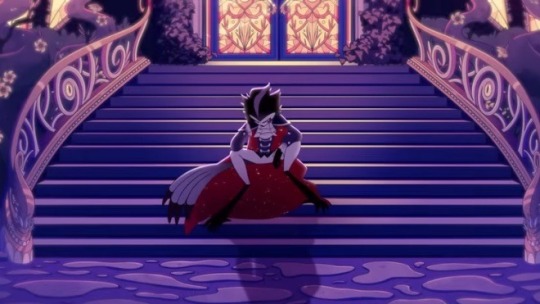
Longer analysis under the cut
Throughout the series you can see that when Stolas is upset or vulnerable in front of other people, he defaults to politeness and royal decorum.
Some good examples of him doing this in front of Blitzø is Ozzie’s. When Blitzø insults his date outfit Stolas is visibly upset, but quickly regains his composure into a noble strut, and when Blitzø pushes him away at the end of the episode Stolas gives him a formal bow. Only when Blitzø drives away does Stolas give himself the freedom to cry (and even then it looks like he's holding himself back, even when alone).
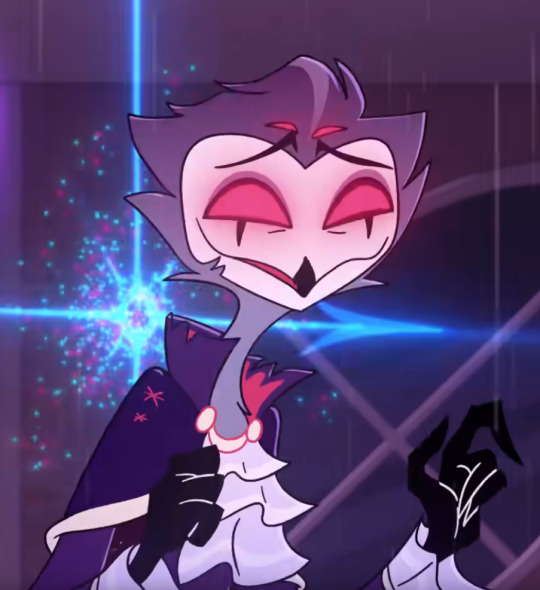
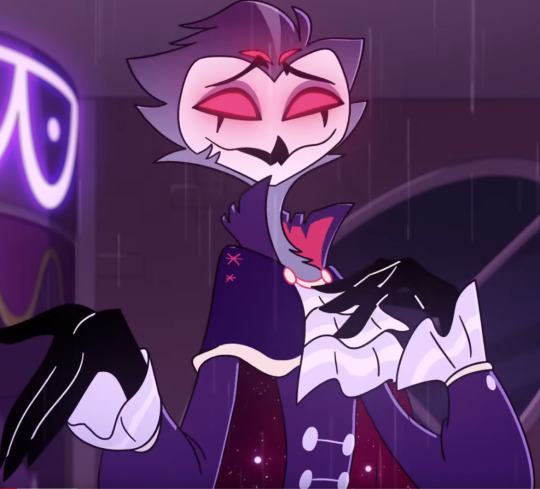
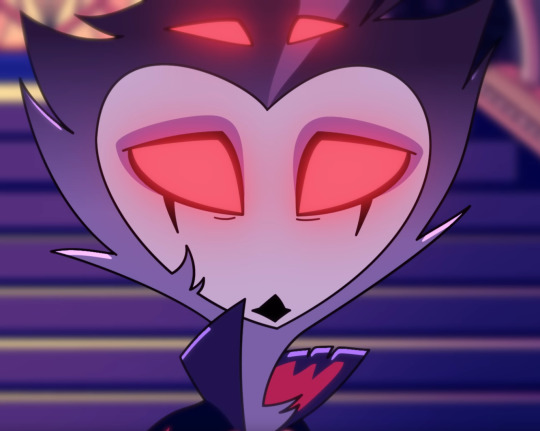
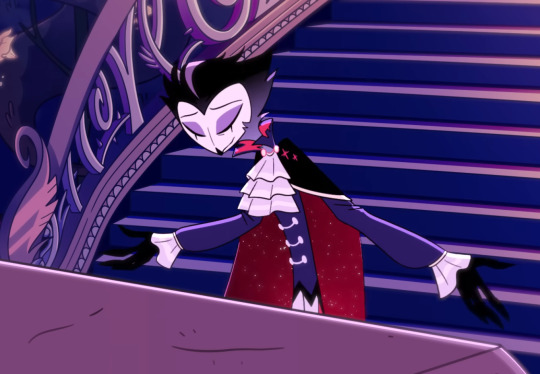
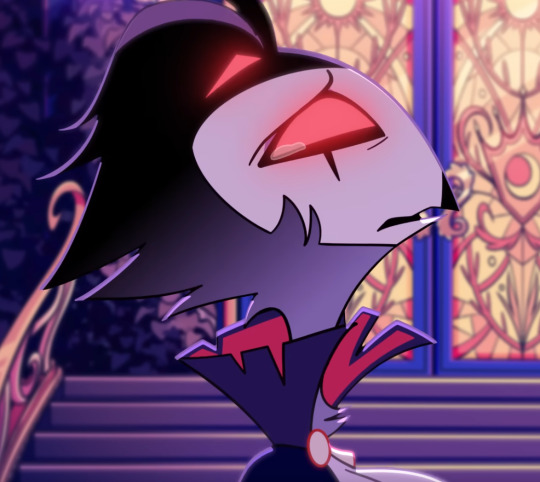
Stolas not being willing to cry (especially in front of other people) is also a common through line, and both of these behaviors can be very easily rooted back to his father. Throughout The Circus we see Paimon policing the way Stolas expresses himself, such as scolding him for crying or bowing to an imp.
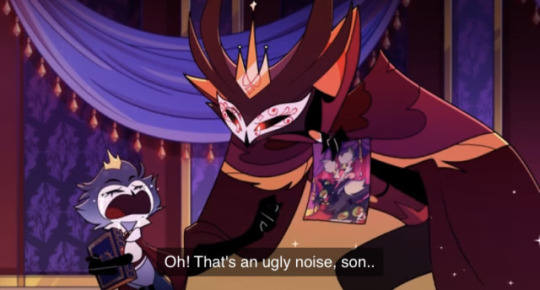
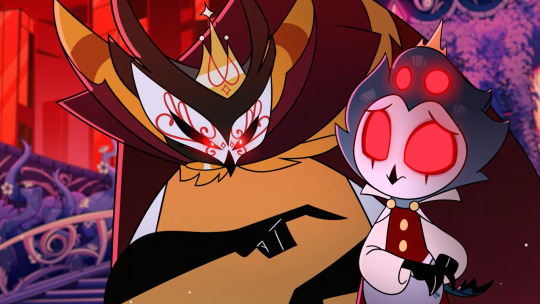
This is also why he got such a thrill when flirting with Blitzø, since that’s one of the only times where he can be very outgoing and crass.
In regards to his relationship with Octavia and Stella, Stolas clearly is taking on the role of the Peacemaker for the sake of Octavia. This is pretty explicitly stated in The Circus, but can also be inferred from the fact that Octavia didn't realize her parents hated each other so much until she was older back in LooLoo Land.
So Stolas’ strategy for dealing with Stella is not to match her anger and potentially escalate the conflict, but instead quietly endure for the sake of peace (and appearances). Even when he's visibly angry at Stella during their Still-Not-Divorced party, he doesn’t even speak to her. He just withdraws with some alcohol (and then Blitzø). His strategy to things that upset him (and especially anger or cruelty directed at him) seems to be to just leave as soon as he possibly can, and if he can't then endure it without showing how upset he is.
(It's also worth pointing out that what Stella described when she and Stolas sleep together also looks like withdrawing behavior. It's just all over their marriage, really.)
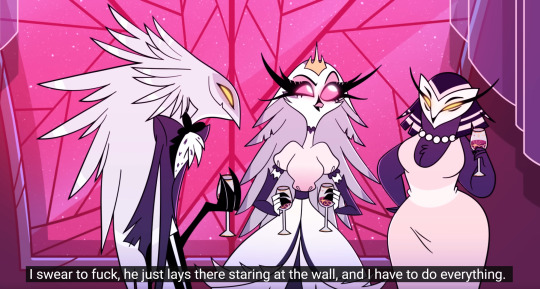
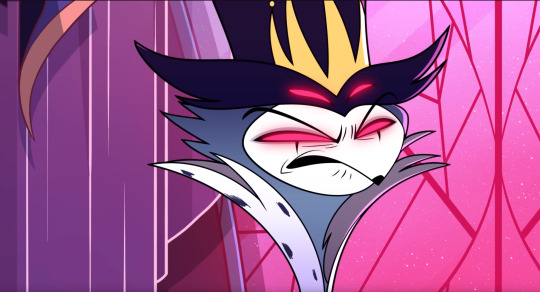
So during their confrontation in The Half Moon, you can see Stolas go through every single one of these trauma responses as he feels like Blitzø rejects him.
When Blitzø harshly pushes back against Stolas’ confession (because Blitzø cannot comprehend someone sincerely liking him like that), you see Stolas put his regal hat back on and emotionally retreat to his usual politeness with "I wish you the best for your business," before physically retreating by walking out of the room.
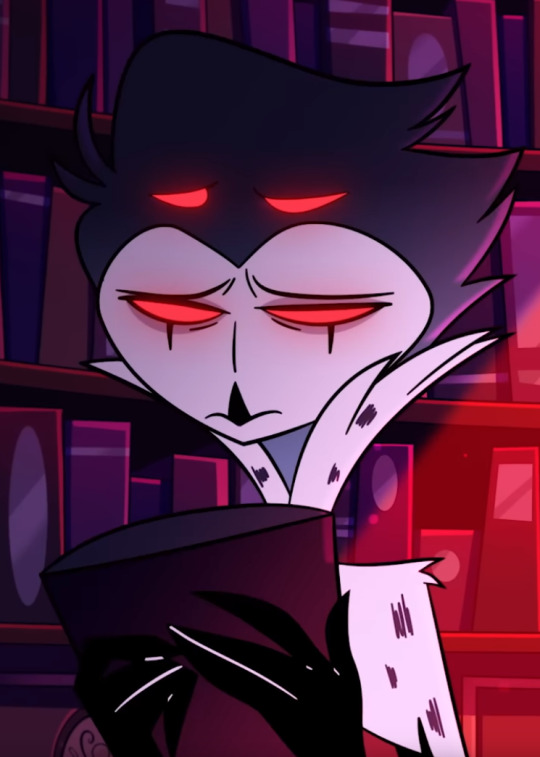
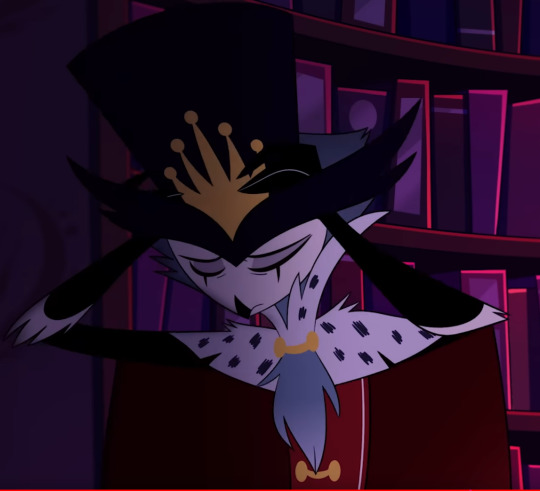
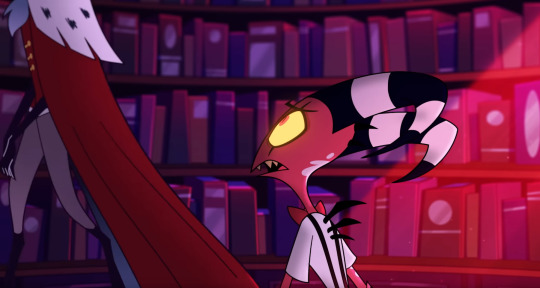
My guess is he was already close to crying by this point and was trying to withdraw from the situation before Blitzø could see it, but Blitzø chases after him. Even as Blitzø yells at him, he keeps his face turned away as much as possible.
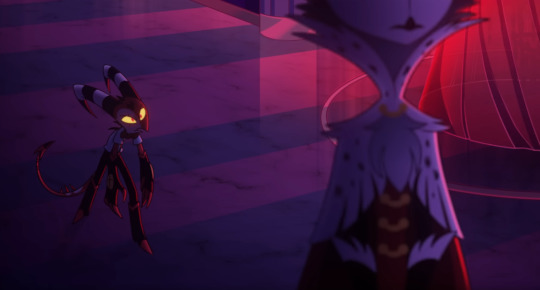
He never interrupts or argues back when Blitzø lashes out at him (which could be reminiscent of the way Stella always lashed out). He then gives his single response, unable to hold back the tears anymore (which Stolas only barely turns for Blitzø to see), before a quick goodbye and teleporting Blitzø away before he can even receive an apology.
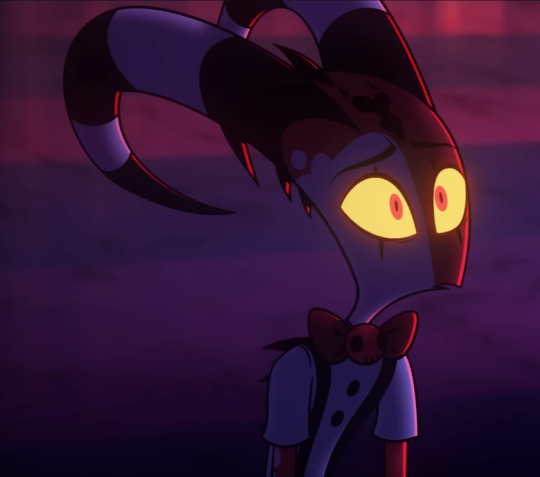
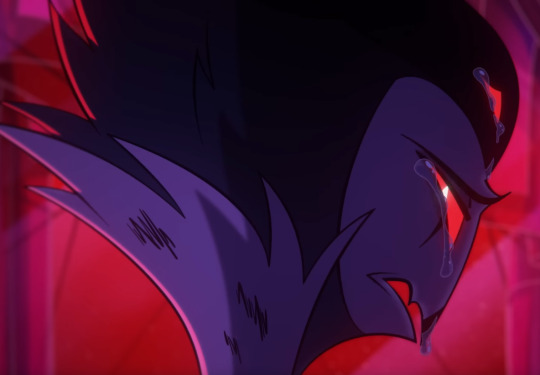
(Also, since this is definitely the first time Blitzø has ever seen Stolas cry, this moment hits even harder for the both of them.)
If Stolas had waited a little longer to hear that apology, or just stayed to let Blitzø process what he was hearing, the break up might not have happened. But then he wouldn't be acting like Stolas, would he?
A lot of people have correctly pointed out that Stolas was incorrect in not giving Blitzø the proper time to process any of their conversation, and that Blitzø’s trauma made him react the way he did. But what I do love about how the confrontation was written is that it's not all one party's fault or the other. Both of their traumas have instilled certain responses that clash beautifully this episode, between Blitzø’s instinct to push back and Stolas’ instinct to pull away.
It's a goddamn soap opera and I love it.
(Side note: the trailer revealed clips that seems to show Stolas' going on a petty revenge streak with Blitzø due to this breakup, which I think will be both fun to watch and a good/interesting step for Stolas' character. It will be one of the few times he properly expresses his anger and makes a scene rather than placate one. Though with that kind of intoxicating rage I can definitely see him taking it too far, especially since the breakup wasn't solely Blitzø's fault, but both parties are likely to interpret it that way. Thus, the soap opera continues.)
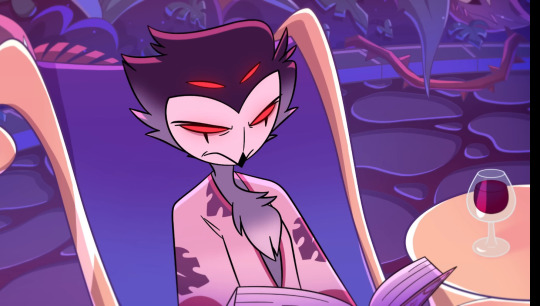
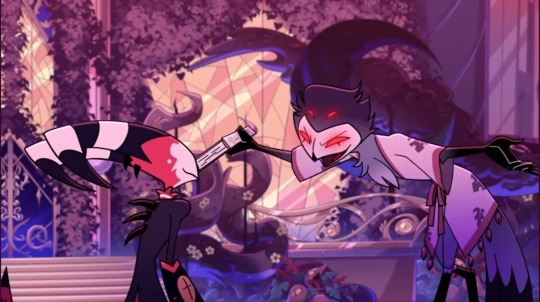
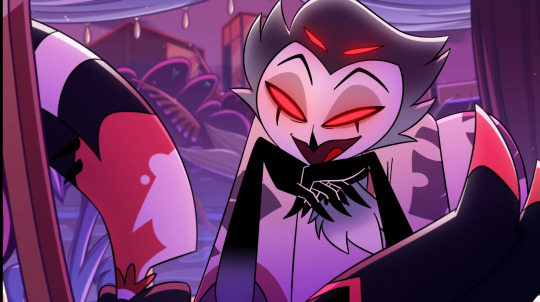
#helluva boss#helluva boss spoilers#stolas#stolitz#blitzo#puff talks#puff analysis#helluva boss analysis#also immensely funny this episode came out right at the end of may#truly a way to celebrate pride month for the sad gays
147 notes
·
View notes
Text
In Defense of Charlie x Vaggie:
Hazbin Hotel is far from a perfect show. I quite enjoyed it, of course, but that doesn’t mean that it lacks significant issues (not that I mind, nothing is perfect, and I believe people should be allowed to enjoy flawed media). One such complaint that I see often is that the show’s “main couple,” protagonist Charlie and her girlfriend Vaggie, are “boring,” or that they “lack chemistry.”
Personally, for me, the relationship between these two ended up being one of, if not my favourite part of the show. I’ll admit my bias that as a lesbian myself, I’m always a sucker for any kind of wholesome sapphic relationship that I can get in the media. Even so, though, these two stood out to me particularly well.
And while, yes, I can absolutely see why their dynamic isn’t the most favorable to some people, I don’t think it’s correct to say that the writers “can’t write meaningful relationships” or “don’t understand love” (which are both real comments that I’ve seen whilst I’ve been a part of this fandom).
The first and most blatant criticism that I come across is that the two are rarely affectionate with each other, and while this seems to be the case at first glance, I can’t help but disagree. Though we rarely see the pair actively kissing or engaging in other activities that one would perceive as romantic, it’s clear that they find comfort in each other’s presence, even if it’s subtle.
Throughout season 1, the viewer is shown numerous instances of Charlie especially being comforted by her lover’s touch. For example, while Charlie is on the phone with her father, Lucifer, at the beginning of episode 5, we can observe that she is clearly anxious about the interaction. When it’s clear that Charlie is getting stressed, Vaggie opts to take her hand, and it can be inferred from her expression in the moment that Charlie appreciates this gesture, even if she finds herself preoccupied.
Keen-eyed watchers of the series will notice that the two are frequently seen in contact with each other, or at least in close proximity, implying a love language related to physical touch. However, while frequent, some argue that these little exchanges aren’t enough to sell the idea that the couple are truly involved with each other.
People seem to be disappointed that we don’t get to see any more intimate or outwardly romantic interactions between the pair outside these small snippets or the More than Anything reprise (which in truth was unfortunately very short). But in my personal opinion, I think this dynamic makes them even more compelling. Sure, they may not be the most affectionate of partners while on screen, but I never needed them to be in order to be convinced of their love for each other.
Keep in mind, Charlie and Vaggie have been together for years, they’re out of the honeymoon phase. They’re also both incredibly busy people, especially with the updated, much sooner extermination date introduced in episode 1. As much as it sucks, doing cute stuff with their respective partner probably isn’t their priority.
The beauty of this, though, is that despite it all you can still feel their love. Vaggie would do anything for her girlfriend, and she does. Their relationship is built on such genuine, wholesome trust and support for each other.
You can tell from the way they look at each other, and from the way they talk to each other, that even despite the chaos and despite the time, they are in love. So much so that even a potentially devastating reveal like Vaggie’s true identity is nothing more than a speed bump for them. It’s really quite lovely to see.
That’s why I can excuse the atrociously short run time of their duet, it’s their first moment of peace in months, and possibly their last ever, they don’t have time to do much, and yet they choose to spend this time declaring their love for one another, because they are still the most important things in each other’s lives. It’s so blatantly clear that their love is genuine, in this moment and outside of it.
I personally feel as though, in the world of the show, the relationship between Charlie and Vaggie is very realistic given the situation they’re in, and if I’m being honest, they have the kind of relationship that I myself would love to have.
In short, I understand why some people don’t like this pairing. I can understand liking other things better, and I don’t dislike anyone who does. I can understand wanting more from it, and hey, I’d appreciate it if they sprinkled in a few extra kisses next season just to feed the fans, but that doesn’t mean that what’s there doesn’t already exist. In my opinion, I think Vaggie x Charlie is beautifully written.
There are honestly so many other little things I could bring up about why I love these two so much. You are, of course, welcome to disagree, but I encourage those who do to avoid harassing those who contributed to the writing of Hazbin Hotel, or those who actually do appreciate this aspect of the show.
However, I also insist that people try to look beyond the surface, to see the detail and the beauty of this pairing, as well as other aspects of the show, or other pieces of media.
Because art is beautiful.
150 notes
·
View notes
Text
The Boyfriend: Why Shun Needs Hugs (Deep Dive Part 1/3)
My brain does not want to shut up about the dynamics on this show, and I am ready to fight everyone talking smack about Shun. Look, that boy needs to be hugged, not shamed, and that is a hill I am ready to die on.
Emotions are complicated and messy. Sometimes the things we want the most are the things we are the most scared of, and sometimes we desperately struggle between wanting to connect and wanting to protect ourselves from pain and doing neither well. It’s a bit like trying to go left but also go right and just pacing back and forth and not going anywhere. What was meant initially to be a simple reflection of exploring Shun’s behavior through the lens of attachment theory took on a life of its own, and now we have parts.
So here is part one, in which we look at Shun's behaviors through the lens of anxious attachment and I draft adoption papers 24 years too late.
Shun as presented in episodes 1-6 of The Boyfriend, has anxious attachment written all over him. **I think it is MASSIVELY IMPORTANT to understand that I am not saying Shun has an anxious attachment style.** First and foremost, what we as watchers see is only a series of filmed interactions edited together. Even if we could see 24/7 unedited footage from the moment Shun stepped into the Green Room, we would still only be seeing a small part of Shun’s life, during a time where he is outside of his normal life and environment. Secondly, we can only see what is outwardly observable, so at best our perspective is based off of guesses and interpretation for which there is no way to validate, elaborate on, or clarify.
For context, in a super brief, overly simplified cliff notes version: anxious attachment is one of the insecure attachment styles included in attachment theory. Attachment theory describes common behaviors and characteristic of 4 primary attachment styles (of which anxious attachment is an insecure attachment style).
Second note: attachment is not static, remember, emotions are complicated and people don’t fit into neat little boxes. How we attach in different relationships with different people at different points in our lives is unique to that relationship and that context.
Now back to Shun (well, my interpretation of the Netflix reality TV edited version). Some behaviors I have seen demonstrated by Shun in the show that characterize anxious attachment include:
fear of rejection
Frequent need for validation, reassurance, attention
Low self-esteem
Intense desire for intimacy and closeness, but afraid of abandonment- contributing to the push/pull of clingy to pushing away
Difficulty trusting others
Jealousy
For children who grow up feeling as if their needs are not met, with inconsistencies in caregiver responses and an environment that feels unpredictable and perhaps unsafe - they have a higher risk of developing an insecure attachment style (such as anxious attachment) because they did not experience secure attachment bonds.
Think about what Shun has shared of his story: Shun never knew his parents. Most likely they abandoned him, and he doesn’t know why. He grew up in a children’s home/orphanage. He was raised by caregivers who took care of him because it was their job. It is reasonable to infer that there was likely turnover in staff at an unknown frequency, and there was likely inconsistency in how staff treated him. It is possible that other children came and went, possibly were adopted. There was nothing stable or secure in that environment, and the even the most loving of caregivers weren’t family and could leave at any time.
Additionally, he made two comments that set my trauma spidey-senses tingling. Per the Netflix translation, Shun said “Even there… I went through a lot.” Quickly followed by, “And… well, after a lot happened, I ended up coming to Tokyo on my own.” He then added that since coming to Tokyo he has been free, which was said with a little smile and a nod that pierced me to my core. The way he presented while telling his story, so matter of fact with a level of detachment, is very consistent with how I have experienced many trauma survivors telling their stories.
Now add to all that what he has shared about his past relationships - primarily that he had experiences with “player types” that were clearly painful enough that seeing whatever pictures he saw on Dai’s phone triggered him to the point of tears. He described one relationship as horrible, he “couldn’t get out of it.”
When you think about what that man has been through, is it that strange that while he may desperately long for love and intimacy, that he’s also terrified of being vulnerable in the way you have to be to get it?
Part 1 | Part 2 | Part 3
#the boyfriend#the boyfriend netflix#hugs for Shun#it might be all in my head#i think too much sometimes#shun nakanishi#dai nakai#dai x shun#shun x dai
63 notes
·
View notes
Text
Minato & Kushina: A "Deep Dive" Analysis (Section A, Part I)
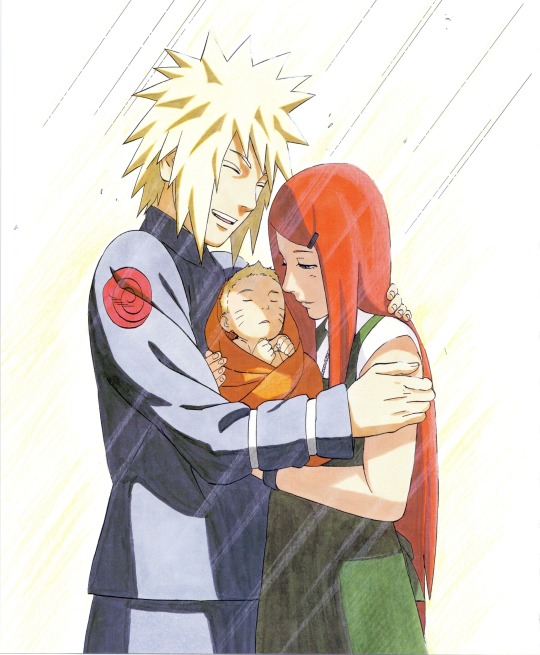
Greetings and welcome to a deep-dive into this masterpiece of a love story, where we will be analyzing Minato and Kushina as characters and examine their bond on the personal and plot level. We'll have five overlapping sections as follows, considering Minato and Kushina:
A. as each other’s anchors;
B. as drivers in the world narrative;
C. as cogs in the Konoha narrative;
D. as perfect compliments; and
E. as foils/parallels to other characters.
Due to the image-limit per post, I have split each section into smaller, more digestible parts. A link at the end of each part will take you to the masterlist. Now let us commence.
(Spoilers for the manga, anime and occasional spin-off. You've been warned.)
(Section A) Minato and Kushina as each other’s anchors
Let us start with some brief yet profoundly meaningful etymology. "Minato" (ミナト, 港) is the Japanese word for harbor, a safe haven for ships. "Namikaze" (波風) translates wave wind(s) – or wind wave(s) – and "Uzumaki" (渦巻き) whirlpool. Put together semantically, Minato is Kushina’s ‘harbor amid winds and waves;’ the anchorage point that keeps her from drowning in the turmoil of being Kurama’s jinchūriki.
Kushina’s strength meanwhile, as we shall see, is the reason Minato fell in love with her, and she he humbly ascribes as his pillar and constant in all spheres of life:
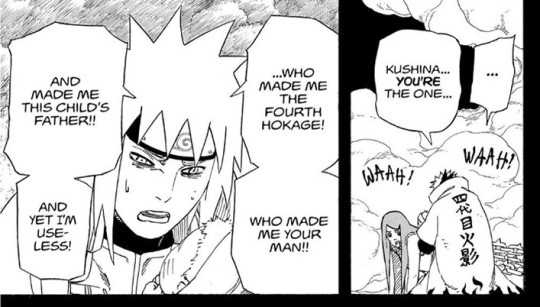
In this first section we will explore how these anchorages were reached. Seeing the first reveal of their bond traces all the way back to geninhood, let us start at the event pinnacle to Naruto’s question:
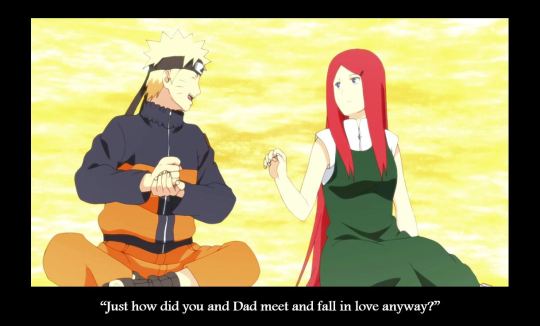
(A) I. Kushina as Minato's anchor
Long before he declares it in the oneshot, Naruto Gaiden: The Whorl Within the Spiral, Minato’s attraction to Kushina’s strength is inferred in metaphor. After saving her from the Cloud ninja, he says he noticed her hair right away. This manga chapter, in fact, is named after it: My Ma’s Red Hair.
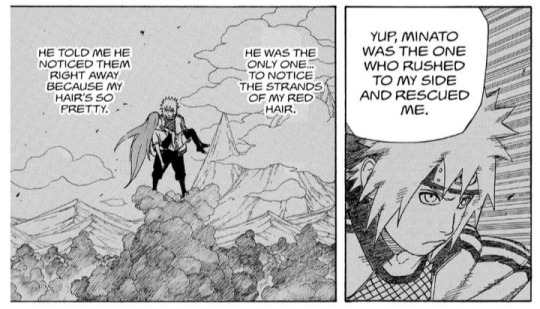
The anime’s expansion (episode: The Orange Spark) draws a subtle link between Kushina’s hair and strength – which Gaiden goes on, as we’ll shortly see, to stress as directly synonymous. The rescue infers two things about Minato’s feelings. First, his “right away” noticing of Kushina’s hair was because of its beauty. Him noticing the trail is not a singular event; he had been noticing her beautiful hair ever since they’d met at the Academy.
Second is the more subtle inference – that it was Kushina’s hair specifically which drew Minato to her. In symbolic terms, Minato was drawn to her strength:
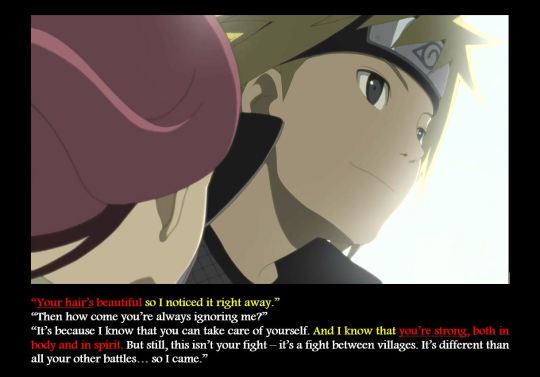
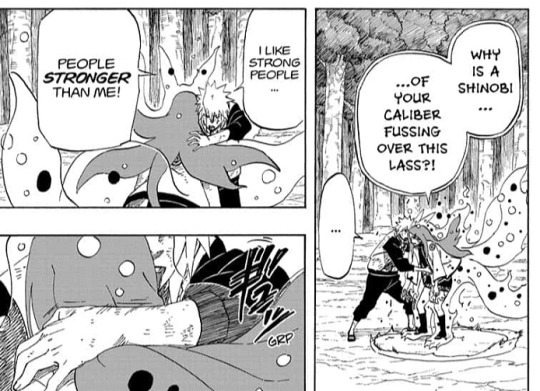
Minato’s noticing of Kushina’s strength is weaved through her recount of their childhood. We are shown it in the classroom when she catches him laughing as she takes on her bullies. We are shown it again when she spots him in the sakura tree after her scuffle with a genin. Where the rescue reveals this implicit link, however, Mito in Gaiden states the explicit. Assuring Kushina in her fears of hosting Kurama, Mito ascribes their hair to strength:
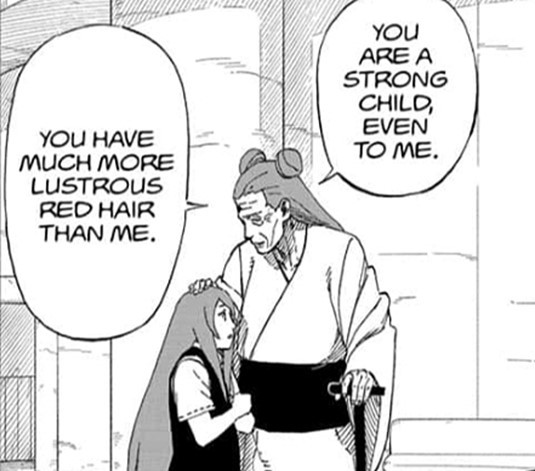
Every fullblood Uzumaki in the series (bar Ashina) has a different shade of red hair. Nagato’s is darker, like the aged Mito’s, while Karin’s is very light. Kushina’s hair, like Mito’s in her prime, is as “lustrous” as you can get – designating her “particularly powerful chakra” among the rest of her clanfolk.
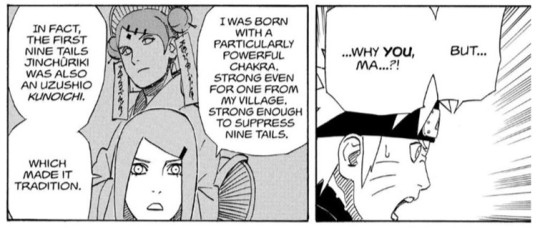
But Mito is not simply referring to Kushina’s chakra reserves. And we are shown this through the declaration of Minato’s love occuring in a paradox.
Severely wounded when Kushina’s seal breaks (her strength failing), and supporting her by augmenting it (being the strength for the both of them), Minato declares with unwavering resolve that Kushina is “stronger than [him].”
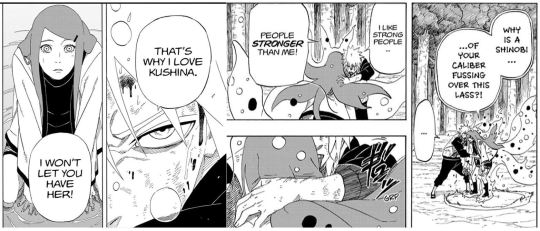
Minato believes, with every ounce of his being, in Kushina’s mental fortitude, and he will risk his life to fight for her, facing Kurama himself. It is in these lines that we find the central theme of the entire series, with both characters serving to embody it:

Kushina has, in her short life, endured a tremendous amount of suffering. She was brought to Konoha to host the most powerful and hateful of all the bijū. She was bullied by her classmates and had no friends, teased and shunned as an outsider. Her clan was massacred. Her home village was destroyed. Kurama tormented her in her sleep. She was under permanent surveillance by faceless guards, to have her every move watched in a barrier circumferencing just a corner of the village.
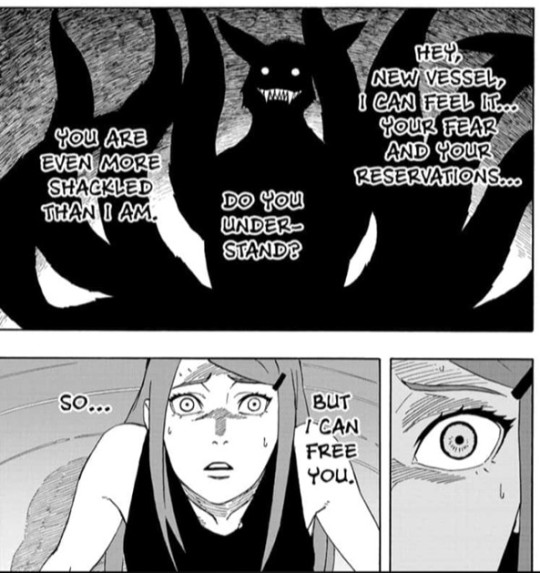
Her endurance throughout it all, first and foremost, is this “strength” that won Minato’s heart. And this strength plays a monumental – if not the center role – in him becoming Hokage. (We will focus on Hokage in Section B, but this is summed in our starting panel and the anime screen below: “Kushina… you’re the one. It was you that made me the Fourth Hokage.”) If a ninja is “one who endures,” then the Hokage is the ninja who walks in endurance before all the village. How awesome that Minato’s inspirational drive is his number one supporter and other half.
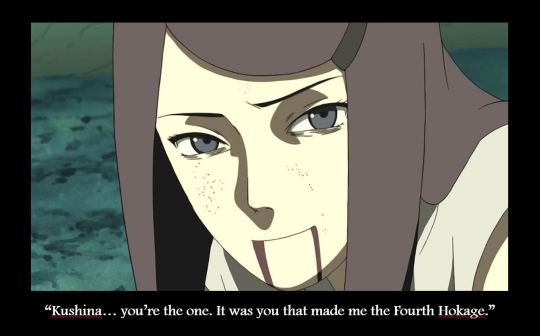
Now it baffles me how many readers/watchers miss just how strong (mentally and physically) Kushina is. So let us elaborate with the starkest display: the night Naruto is born.

She gives birth – not an ordinary birth, note (already an exhausting ordeal). But a long, agonized labor with Kurama wresting to break out of her. Then Kurama is forcibly extracted – an event which thanks to her “particularly powerful chakra” elongates her death, leaving her body in a slow, taxing battle for its draining life. Minato saves her from Kurama’s strike and she tells him to save the village, thinking of everyone else as soon as she learns their baby is safe.
The now-dying Kushina spends the short duration of Kurama’s rampage with her newborn son. She should be resting. She should be healing. She should be in her husband’s arms. Instead, with no alternative for the village’s sake, she is brought with Naruto to the battlefield.
Kushina – on death’s doorstep – pins Kurama with her Adamantine Sealing Chains, projecting a barrier to stop him escaping AND keep the villagers OUT. A jutsu that leaves her coughing up blood as she expends her fading chakra. A barrier so strong that Hiruzen, hailed the “God of Shinobi,” cannot get through it.

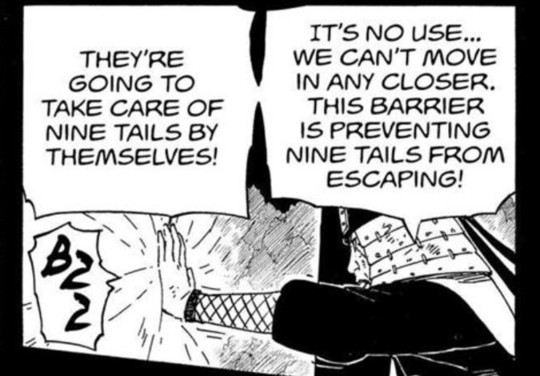
While she holds Kurama down (and Hiruzen out), she tells Minato she’ll take Kurama with her – i.e. she will reseal THE ENTIRE Nine Tails back inside herself and drag him with her into death. She has just pushed her baby into the world, had Kurama ripped from her body, and is, with her lifeforce draining away, prepared and able to seal him back.
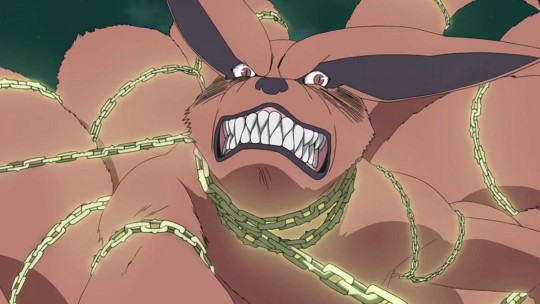
Kushina keeps Kurama pinned while under the greatest mental anguish a wife and mother could experience: her husband plans to sacrifice himself, leaving their baby an orphan, and make their baby – THEIR NEWBORN BABY – the next JINCHŪRIKI. She argues but accepts Minato’s decision even though it crushes her. Then when Kurama strikes to kill Naruto she also moves in to shield him. Kurama’s claw through her belly, Kushina still keeps him chained, buying Minato the rest of the time he needs to finish the seal.
Her nindo, lived out here, can be summed by her favorite phrase, which according to the databook is: 最後まで諦めない (“Don’t give up until the very end”).
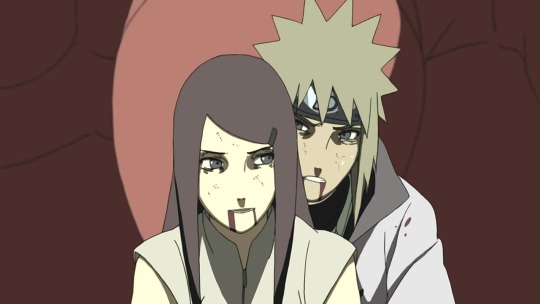
This is the mental fortitude that Minato is talking about. And when he says “stronger than me” you can bet he means that in every definition of the phrase. (Now please don’t misunderstand: I am not at all saying Kushina could best Minato in battle. I am saying that when it comes to sheer endurance and resolve, Minato views her as his stronger half. Never does this take from the other side either – Minato being Kushina’s stronger half. As we’ll discuss particularly in Section D, they are perfect compliments.)
Kushina being Minato’s pillar carries through even after their deaths. When Minato is resurrected with Edo Tensei, he fights at Naruto’s side, facing their odds with the following inner monologue:
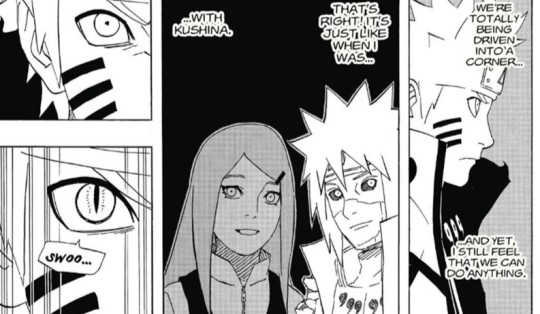
Later, again, as Naruto carries out his strategy, we get:
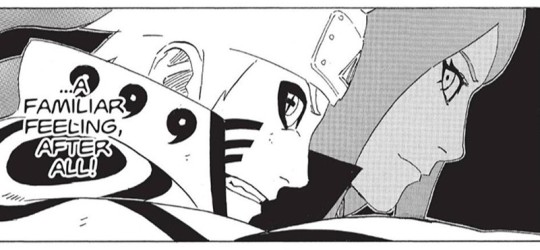
So Kushina is Minato’s inspiration, drive and rock, embodying the theme of endurance. We will return to this theme in terms of Hokageship, but let’s next look at the other side of the coin: Minato as Kushina’s 'harbor' and how his love enables her to overcome Kurama.
Section A, Part II here.
#naruto#naruto shippuden#naruto gaiden#the whorl within the spiral#boruto#manga#anime#minato x kushina#minakushi#namikaze minato#minato namikaze#minato#uzumaki kushina#kushina uzumaki#kushina#kurama#uzumaki naruto#naruto uzumaki#character analysis#my deep dives
18 notes
·
View notes
Note
Hi, I started planning my own KND fic, and started with figuring out the ages and birthdates, and I have to ask. 1. How was it for you the process of coming up with a chronology of a show that doesn't really have a set and consistent timeline? 2. In what year does your fic takes place?
My process and answer is long so have it at under the cut
The first part of my process was deciding if I wanted a set timeline or just to go with what worked for me from fic to fic. Over the years (and after watching the series hundreds of times and taking novels worth of notes and screenshots), I’ve settled on a set timeline that works for me and what I like to do.
(Fun fact: I have 3 different timelines! 1 is the main one I use, and the other two are bit more loose depending on the AU I wrote. In one, the GKND doesn’t exist.)
First, I would decide how religiously you want to try and make sense of the timeline the show tries to give us. There aren’t many, but there are a few events that have specific years that can be pinned down. For example, one is the Great Junior High Rebellion of ‘99 where the recommissioning module was allegedly “damaged beyond repair” (maybe they didn’t try turning it off and back on again?). The next one is 1969 where the KND faked the moon landing so adults wouldn’t discover the Moonbase. They’re small throwaway mentions, but important if you need some dates to anchor to.
Also consider that (probably almost) everything in season 6 that’s not a flashback happens AFTER Op. ZERO due to the shots of the Moonbase being the rebuilt Moonbase Zero.
Now, saying all that, my next piece of advice may be weird, but honestly, I think it’s important: don’t stress too much about it! Details are essential, but getting hung up on them can be a headache and stop the process. As you mentioned, the show doesn’t have a consistent timeline, so trying to make sense of everything will run you up a wall.
Just breathe and pick any year or era you want that makes sense or resonates with you! Wanna set it in 2018 or even in 2024? Go for it!
But why aren't kids/teens seen using smartphones? Maybe there’s super duper strict regulation that keeps anyone under 13 (perhaps even 18 because Father apparently controls the Teen Ninjas) from not having smartphones, and the KND uses 2x4 tech as a way to get around it. There’s already legislation in the works in the US that does this already to ban kids from using social media.
How come sector V are all in the same grade yet are different ages? Again, maybe in this world, there’s some super weird law the adult villains lobbied for that keeps kids in certain grades for extended times. There was literally an episode that ended with a 4th Grade President going to City Hall and coming out and saying, “by the way, school day ends at 8:25pm now. Sucks to suck, also Father is the best.”
Let the show's lack of a consistent timeline be an unexpected strength! Besides one or two cultural nods as the show evolves, there's not too much to date it. For example, they make up corporations and franchises to parody real ones and never give the name of a sitting world leader.
Also, it’s a cartoon, and their world is not bound to the same laws as ours. It’s not real life! Be silly and stretch things if you need to! If trying to take the show and make it more realistic is your goal, then, of course, do that as well! Just for me personally, I try not to get bogged down with “this event or timeline doesn’t exactly match up or happen how it would in real life” because I’m not writing real life: I’m writing Kids Next Door fighting candy monsters or the living avatars of puberty.
I’m getting off-topic. Anyway, the last piece of help I offer is just (if you can) rewatching the show and paying attention to context clues in the background! In season 5, two shots of a gravestone end with 2005. So, with that in mind, we can infer a few things:
1. From wherever you put that episode in timeline, it at least happens during or after the year 2005.
2. The same gravestone appears again in IT, so everything that has happened up to Rachel deciding to call a game of tag, again, happens either during or after the year 2005.


Take that as you will!
For the next part of your question! If you’re talking about Cold Reception SPOILER AHEAD BECAUSE IT WILL NEVER BE DIRECTLY STATED IN THE FIC! ....
...
...
...
you really wanna know?
...
...
...
...
The year Cold Reception takes place is 2011.
Hope this helps! If not, let me know and maybe I can give more specifics! Good luck on your fic! Writing is fun.
#knd#my writing#my process#timeline creation#worldbuilding#also that bit about “not real life” is just about fantastical elements and aesthetics#asks#always happy to help if i can
9 notes
·
View notes
Text
THE CASE OF THE GREATER GATSBY EPISODE 17 MOMENTUM AND EPISODE 18 SMOOTH
What a lucky girl am I. Citizen Jasper Fox one week, then Mel’s Christmas party (narrated by Cliff and Willie of all people!) the next. The Persauds truly are spoiling me. And so many details to mull over!
Full mulling under the cut. It’s long, there are theories, blah blah blah. You know the drill.
So, uh, guys, DID I ACTUALLY GUESS IT?? Is my wild-and-crazy Sheilah/Mel theory from a couple of posts back actually on the money??? We haven’t gotten full confirmation from the story yet, just suspicion from our characters, and since it’s my theory I’m going to refuse to truly believe until there’s no room for doubt. But Fig and Ford have happily jumped aboard the good ship Meilah, and I’m soooo here to see how that plays out.
On the other hand, the other part of that theory, that TD is Fitzgerald’s mysterious midnight murderer, doesn’t hold up as well. Wilhelmina and Cliff vouch for the fact that he was at the party between Fitzy’s exit and 1am. This doesn’t necessarily mean anything—Scott was too drunk to record the exact time of his own murder, and while we can infer that it was before 1am (as he probably started recording the moment he arrived home), we don’t know for sure. But even if TD didn’t head to Fitzgerald’s in the dead of night, we still have to account for his hour-long disappearance earlier in the evening. Sheilah notably mentions that she cannot find her keys at around the same time that TD goes missing. As staff able to take people’s coats, TD was perfectly situated to lift her keys without being noticed. He likely spent that missing hour breaking into Scott’s and Sheilah’s house, right? He could have been trying to acquire a copy of Greater Gatsby for Mel, accomplish something related to his quest to join the Brigade, or even follow some order from Mel related to Sheilah’s and Fitzy’s latest spat. After all, we know from an off-hand comment from Cliff that the pair had recently had a fight dramatic enough to become full-blown Hollywood gossip.
But Fitzgerald’s murder is not the only mystery to solve. Do we think this Horace Beanslot, with his apparent disdain for original stories, has anything to do with the mysterious death threats plaguing adaptions? Think about it: Horace strikes down Mel’s passion project idea, over-ruling her enthusiasm for genuine storytelling and art (who knew?) because adaptions are a financially safer bet. Barely a week later, Wilhelmina receives the first in a series of threatening letters targeting those involved with making said Hollywood adaptions. What if the letters are an intentional plan cooked up by Mel and/or TD to make adaptions toxic to Hollywood, encouraging Beanslot to allow Mel’s original passion projects instead? That would explain why so many of the letters were dropped off around the Grapes set without anyone noticing—it would be easy for TD or hired help to deliver all manner of things without attracting any attention. A quest to destroy Hollywood’s adaption habit could also explain why Mel seems to be almost actively sabotaging The Grapes of Wrath at every turn.
And then, ever so inevitably, there is the Dash of it all. What the flippity-flappity-frick was he doing at that party? Fitzgerald had yet to be murdered, Wilhelmina had yet to receive the first letter… all of the cases Fig and Ford are investigating technically hadn’t started. So was Dash there on a matter unrelated to what he’s working on now? Or is he part of something that began much earlier than we know? I mentioned last time that Dash only really appears when Willie is around, and this pattern held true once again. Maybe Roger hired him to keep an eye on Wilhelmina while he was away in the slammer? Alternatively, is/was Dash somehow working for Penny? I don’t think this is particularly likely, their alleged Christmastime hook-up feels more like a cheeky nod to Joey and Lauren’s real life marriage, but it seemed worth asking.
As for the interviews, I’m afraid they were a little more informative to Ford than they were to me. It appears we are fast approaching the part of most detective stories in which said detective has figured out the case and chosen to keep their loyal audience (me) in the dark. We’ll just have to see if I can catch up before everything is brought to light. I didn’t get much from Mel and TD, and the Farnsworth Farnsworth aside simply feels like a silly audio-drama bit, but Vivian and Barnaby were as fascinating as always. Much like Ford himself, I was particularly interested to hear that the cops had already questioned Barnaby about his tie clip. Assuming Ford or Claudette didn’t slip up, there’s only a couple of ways the cops could have grabbed that info: Sheilah could have tipped them off, or the cops could have placed it there themselves. We know that Vivian and Mo are very deep in cahoots—what if she gave him the tie clip to place at the scene, and Mo was the mysterious trespasser spotted by Citizen Jasper Fox? We’ve known from the beginning that Vivian is intent on placing the blame for Fitzgerald’s murder at Barnaby’s door, whether he’s guilty or not. Perhaps, due to their pre-nup, locking him up is her attempt to get him out of her life without losing access to his wealth. But if she’s working with Mo, why hire Fig and Ford? And what does our least favorite cop get out of this? Is it tit-for-tat for some help stealing the bar from Bixby? Who knows, maybe Vivian’s having an affair with Mo as well.
Also, speaking of tie clips, Vivian gave F. Scott one on the night of his murder. Coincidence?
Other Stray Thoughts: -Why was Leery’s Christmas so sad? Are the Persuad’s just poking fun at country music tropes, or did he really just lose a love? And does that have anything to do with anything? -Well, Barnaby’s middle name is “Ellis,” not “Eugene.” But you can’t win them all. -We know Mel has mob ties through her sister’s high school boyfriend Lucky Luciano. Does this play into any knowledge she has of Luigi? -Our little Ford’s ice-cold heart is slowly but surely melting and it’s a lovely bit of character development. Just in time for real-life Christmas. -I love Cliff and his friendship with Willie. He’s constantly lowering his expectations and she’s constantly limboing right under them nonetheless. -I desperately want to see this tap-dance adaption of The Grapes of Wrath. Like, what do you mean it will feature actual wrathful-looking grapes??
That’s all I have for these episode! Six more to go!
#shipwrecked comedy#the case of the greater gatsby#fig and ford#fig and ford: the case of the greater gatsby#ford phillips#fig wineshine#mel hammermeister#td hammermeister#dash gunfire#wilhelmina vanderjetski#cliff calloway#leery o'shaughnessy#penny nickelpenny#gg momentum#gg smooth#vivian nightingale#barnaby nightingale
5 notes
·
View notes
Text

TV Fanatic
Shadowhunters: 31 of Our Favorite Malec Moments
Rachel Foertsch at July 23, 2018 3:37 pm.
The relationship between Magnus and Alec on Shadowhunters is one of the best 'ships currently on television.
Alec is a Shadowhunter and head of the New York Institute while Magnus is the High Warlock of Brooklyn. Seeing as they're both in charge of two groups who don't particularly get along, they have the odds stacked against them in almost every way.
Despite their struggles, Alec and Magnus never let their differences keep them apart. They have proved throughout the series that their love is strong enough to overcome anything life throws at them.
Not only are they great representation for the LGBTQ community, but they also have a pure and healthy relationship that everyone can look up to. They're one of the many reasons we're all fighting so hard to #SaveShadowhunters.
It's obviously impossible to name every amazing Malec scene, but we compiled a slideshow of 31 of our favorite Malec moments below!
And don't forget you can see these moments for yourself by watching Shadowhunters online right here on TV Fanatic!
1. Their first time on 2x18 "Awake, Arise, or Be Forever Fallen"
There are so many amazing things that could be said about this scene as a whole. The music, the kissing, and Alec telling Magnus how beautiful he is officially ended us all.
2. Team work makes the dream work on 3x02 "The Powers That Be"
Anytime Malec teams up in the face of danger they always accomplish their goal. It's clear that being around each other makes them stronger.
3. Alec and Magnus' first kiss on 1x12 "Malec"
This was the iconic kiss that no one will ever forget. Alec literally walked back down the aisle of his own wedding to plant one on Magnus in front of everyone. And yes, Magnus and Alec are so epic that they actually had an episode named after them.
4. That time they turned Shadowhunters into a crime drama on 3x02 "The Powers That Be"
Somehow, Magnus and Alec are the best partners in crime and the worst. Being sneaky and subtle is not their strong suit, yet surprisingly they still managed to get the job done.
5. Malec gets domestic AF on 3x03 "What Lies Beneath"
Alec's cooking may not have been the best but thankfully Magnus was there to make some er...magical improvements. But you know what they say, a couple who cooks together stays together.
6. AU Alec pulls a Magnus on 1x10 "This World Inverted"
When Magnus and Alec first met Magnus inferred that Alec was playing hard to get. It's a good thing Magnus and otherworldly Alec both love a challenge.
7. Magnus and Alec kill us with cuteness on 3x01 "On Infernal Ground"
This scene was all kinds of adorable. Once Magnus is truthful with Alec and admits he doesn't want him to go to Idris, Alec tells him that his real dream was finding someone like Magnus. He assures Magnus that he's not going anywhere.
8. Cuddling ensues the morning after on 2x18 "Awake, Arise, or Be Forever Fallen"
Their first morning after was everything we hoped it would be and more. It's clear just how much these two love each other and what the night before meant to them.
9. Magnus being a worried boyfriend on 2x13 "Those of Demon Blood"
Seeing Magnus worry about Alec going out alone was absolutely precious. Honestly, these two couldn't act any more married if they tried.
10. Malec is here to stay on 2x08 "Love is a Devil"
We already knew that Malec was a permanent thing, but hearing Alec say the words out loud to Magnus was especially satisfying.
11. Gift giving on 2x07 "How Are Thou Fallen"
Like Magnus said, Alec is always surprising him. In just one of many examples of him being an adorable boyfriend, Alec gives Magnus an Omamori charm which is said to offer health and protection.
12. Magnus and Alec talk it out on 2x01 "This Guilty Blood"
It's impossible for couples to go through life without facing challenges. But Magnus lets Alec know that they need to work through problems together instead of getting nervous and pushing each other away.
13. Immortality angst on 3x05 "Stronger Than Heaven"
It's not that we love the angst but well...we love the angst. The fact that the basis of Magnus and Alec's fight was that they never wanted to be without each other was somehow both heartbreaking and heartwarming.
14. Alec comforts Magnus on 2x15 "A Problem of Memory"
Magnus finally opened up to Alec about what he was going through and Alec did the only thing he could. He was there for him completely.
15. True love's kiss on 2x03 "Parabatai Lost"
Things were not looking good for Alec this episode. His soul was lost alongside his parabatai's and getting Jace back was the only way to wake Alec up. Although it (sadly) didn't work, the fact that Magnus tried to kiss Alec back to life gave us all the feels.
16. Magnus and Alec's first date on 2x06 "Iron Sisters"
A first date was much needed between these two. They finally got to talk about the things that were important to each of them. Despite Alec not being at all experienced and Magnus being extremely experienced in the dating world, they showed how determined they are to make things work.
17. Malec teaches us about healthy relationships on 2x20 "Beside Still Water"
In the words of Magnus Bane quoting Alec Lightwood, relationships take effort. Magnus and Alec both understand that in order to have a healthy relationship they need to put in the work. And these two are willing to do whatever it takes.
18. Alec tells Magnus he loves him on 2x10 "By the Light of Dawn"
After Alec spent a few horrifying moments thinking that Magnus was dead, we got an epic declaration of love. Their first I love you is always going to be one of Shadowhunters' best scenes and it's impossible to watch it dry-eyed.
19. Love at first sight on 1x04 "Raising Hell"
From the moment Magnus and Alec met sparks were flying. You can tell from Alec's nervous smile and the way he can't keep his eyes off Magnus that he is crushing hard.
20. Magnus and Alec get back together on 2x20 "Beside Still Water"
When Magnus and Alec are together it almost feels like everything in the show is going to be okay. When they were apart the world was very literally falling apart around them. Alec tells Magnus that he can't live without him, and we connected with Alec on a spiritual level.
21. A magical dinner by the fire on 2x17 "A Dark Reflection"
When Alec misses their date, Magnus brings the date to him with a wave of his hand. Having a boyfriend with magic powers sure does come in handy.
22. Alec (literally) gives Magnus his strength on 1x06 "Of Men and Angels"
Even warlocks can run out of power and Magnus was fading fast. Thankfully, Alec was there to offer his own strength in whatever way he needed. Magnus was obviously surprised by Alec's inclination to help him and admitted that it's rare to find a Shadowhunter with such an open heart.
23. The aftermath of Valentine's destruction on 2x12 "You Are Not Your Own"
This entire episode was absolutely tragic. When Magnus is hurting so is Alec, and the devastation when he realized he couldn't take away Magnus' pain is agonizing. This moment may not be a happy one, but it definitely made us emotional.
24. Alec opens Magnus up to love for the first time in a century on 1x06 "Of Men and Angels"
Although Magnus had been in love with both men and women before, he closed himself off from feeling anything for anyone for almost a century. But from the moment he met Alec his heart immediately opened back up. If that's not true love than what is?
25. The heartbreaking goodbye on 3x10 "Erchomai"
This scene was a mess of emotions. Magnus couldn't stand by and do nothing while he watched someone so important to the man he loves fade away. Alec told Magnus that he needs to make it back and of course, Magnus' reply was perfect.
26. Unofficial first drinks on 1x06 "Of Men and Angels"
What Alec doesn't know in this scene is that he's sharing his first drink with the love of his life. Of course, with the way these two couldn't keep their eyes off of each other they must have had some idea.
27. Malec's photo booth pics on 2x19 "Hail and Farewell"
Magnus staring at a photo strip of him and Alec after their breakup was devasting. But we couldn't help but fawn over the fact that Magnus and Alec actually had the chance to go out and do cute couple things. Where's our flashback of the photo booth scene?
28. Magnus tries to convince Alec to call off his wedding on 1x12 "Malec"
We were right there with you Magnus. Even though Lydia was a great character, Alec was only marrying her out of duty and obligation. Magnus could see right through him and tried to get Alec to admit who he really had feelings for.
29. Hug and make up on 3x07 "Salt in the Wound"
These two still had some things to talk about, but in this moment the only thing that mattered was their love for each other. With other things taking precedence, they just had to take a moment to make sure the other knew they were sorry.
30. Handholding on 3x02 "The Powers That Be"
Alec was pretty nervous about being the only Shadowhunter in a party full of warlocks, but Magnus was quick to help calm his nerves.
31. Reconciliations on 2x13 "Those of Demon Blood"
After Alec realized he was in the wrong for asking Magnus for a piece of hair to verify his innocence, Alec assures him that he never has to prove himself. He trusts Magnus implicitly.
10 notes
·
View notes
Text
One Piece Reread Chapter 1: Romance Dawn
It's time to kick off our reread with the very first chapter, titled (by now, very famously) Romance Dawn.
(index | next)

The first thing that comes to mind as I open to the first page is, ironically, of adaptations - at this time, every major screen adaptation of One Piece (it remains to be seen how Wit Studio will play it) has made changes to the sequence of events in the beginning of the story, either postponing the flashback to later episodes (as in Toei's anime) or interspersing the events via flashbacks in the first few episodes (as in the Netflix show). No doubt there are pacing concerns, but I find I much prefer the manga's decision to have the story play out in its entirety before we join Luffy in the present - it allows us to get acquainted with his character, and we already feel attached to him as the journey begins. We know where he came from, and we're already looking forward to travelling with him in pursuit of his ambition.
(There's also just the fact that Romance Dawn is a solid introductory chapter - so much so that its structure can be found in a lot of other manga that came after it. Just look at the first chapter of Naruto, which is almost beat for beat.)
Regardless, we open on the iconic stage-setting of Roger's execution. I'm somewhat vindicated to see that I did remember correctly, the manga (the Viz English translation, at the very least) does specify the manner of execution as beheading. This is another detail that adaptations have shied away from, from what I've seen, at least - either by avoiding showing the actual moment of death (Toei) or changing it to stabbing, for some reason (Netflix). I feel like that takes away from a very strong visual of a man cut off mid-laugh. I would be curious to know if the original Japanese also alludes to beheading, or if it is a more general term for execution that's used.

We travel, then, to Windmill Village, where I'm drawn in by the description of the place:
"A small harbor village. One year ago, a pirate ship made the village its base. The wind blows from the east. And the village is at peace."
It definitely feels like the sort of quote that might come back around, perhaps at the very end.
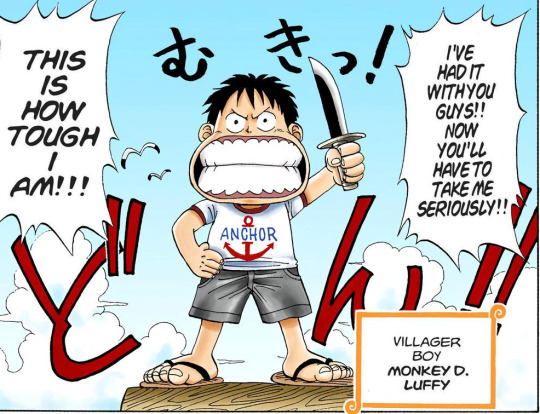
Luffy is first introduced to us as "villager boy" Monkey D. Luffy. The Red-Hair Pirates are nonchalant about his holding a knife, and about his (somewhat ominous) declarations - it's clear that he's already somewhat famous to this, and they're all used to it. Not so used to it, of course, that they're not taken aback by him trying to take his eye out, but by the time the scene changes to the Partys Bar, they're all in high spirits, drinking to Luffy's courage and their voyage. Their familiarity is clear, as is the very early institution of some of the series' most recurrent themes.


From the very beginning, Luffy is drawn to good times, adventure, and, most importantly, freedom.
Interestingly, Shanks rejects his crew's estimation of the pirate's life, which carries fascinating implications for his character. Shanks is pigeonholed often as being relatively laid-back, and while it might often be true, in his first and most extended appearance, he's actually quite serious about instilling the dangers of life at sea.

For as often as he's playing jokes, he's got something to say that sounds incredibly cryptic in retrospect, given what we know at this point, and what we can reasonably infer. (Roger, what was it you said to him when you came back from Laugh Tale?)
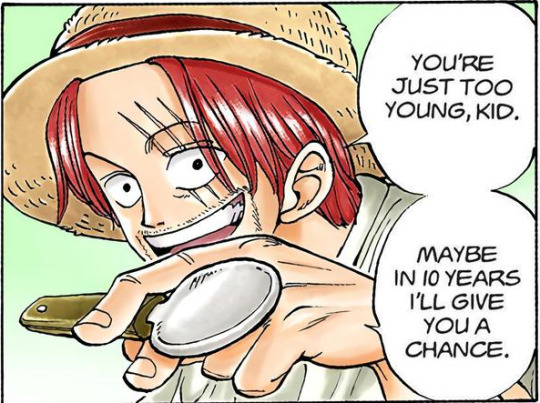
Funnily enough, Luffy seems to have a lot of respect for Beckman - calling him by the very polite "Mr. First Mate" and listening fairly diligently to his explanation for Shanks' rejection (even if he rejects it, though even Beckman admits that Luffy may have a point). For all the ways that Luffy and Shanks are alike in somewhat-irreverent disposition, Luffy does respond well, in this case, to being taken seriously, having Shanks' reasoning explained to him, and being treated with the assumption that he's capable of understanding (put a tally on the "Luffy isn't as dumb as you think he is" chalkboard, and leave a lot of room, because I'm going to be harping on it the whole way through).
Shanks and Luffy's relationship rightfully gets a lot of press, but I think this interaction does a lot to show that there's a pretty solid bond between Luffy and Beckman as well. I almost feel like Beckman was primed to handle Luffy from having to wrangle Shanks for a living.
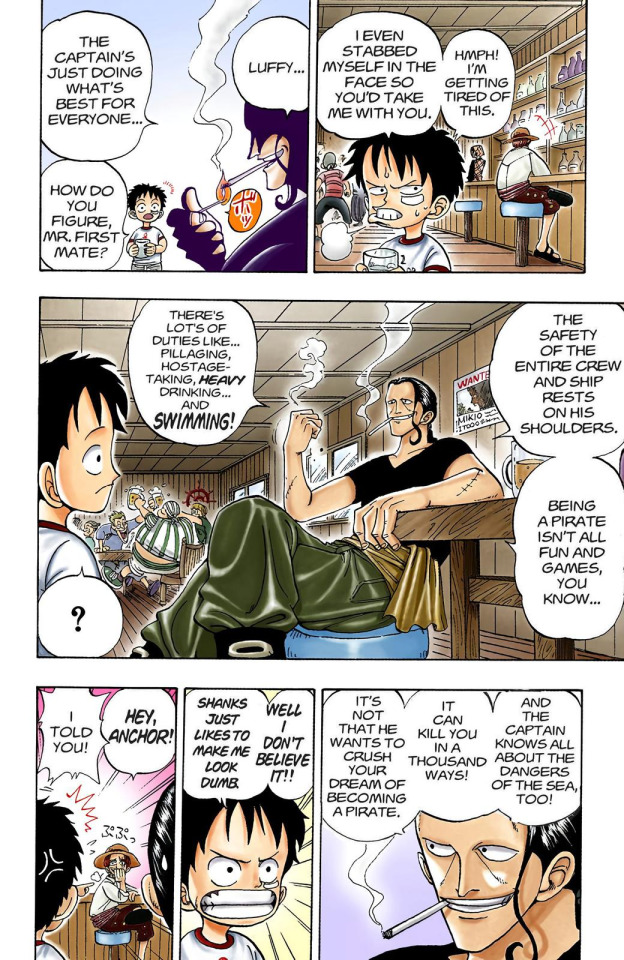

Makino is a character that fascinates me. What happens to leave a nineteen year old as the proprietress of a bar? How did she end up as the one looking after Luffy? I doubt we're likely to get answers, but if our suspicions about her baby pay off, maybe there's a chance.
Higuma arrives, and there is brilliant economy of storytelling in these few panels - Makino's alarm, Shanks eyeing the hand on the counter, poised to step in, and Luffy eating... what is that? This is actually the first panel in which the Gomu Gomu no Mi appears. I actually went back to the last panel Luffy was in to double-check, and he was eating a regular bread roll. It's a Looney Tunes-type cut that provides an almost hysterical, irreverent laugh without breaking the mounting tension of the sequence. It really is a brilliant early example of the series' tone.

Another sequence that I feel the adaptations have failed to capture is that of Higuma breaking the bottles - the breakage is fairly violent, you actually see Shanks struggling with indignity and anger for a moment before schooling himself, which makes the lecture about choosing when not to fight feel much more effective.

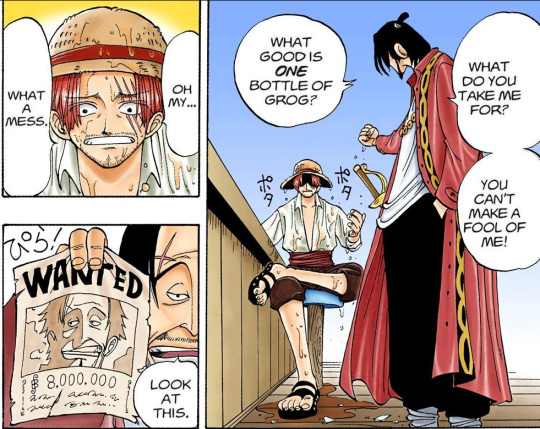
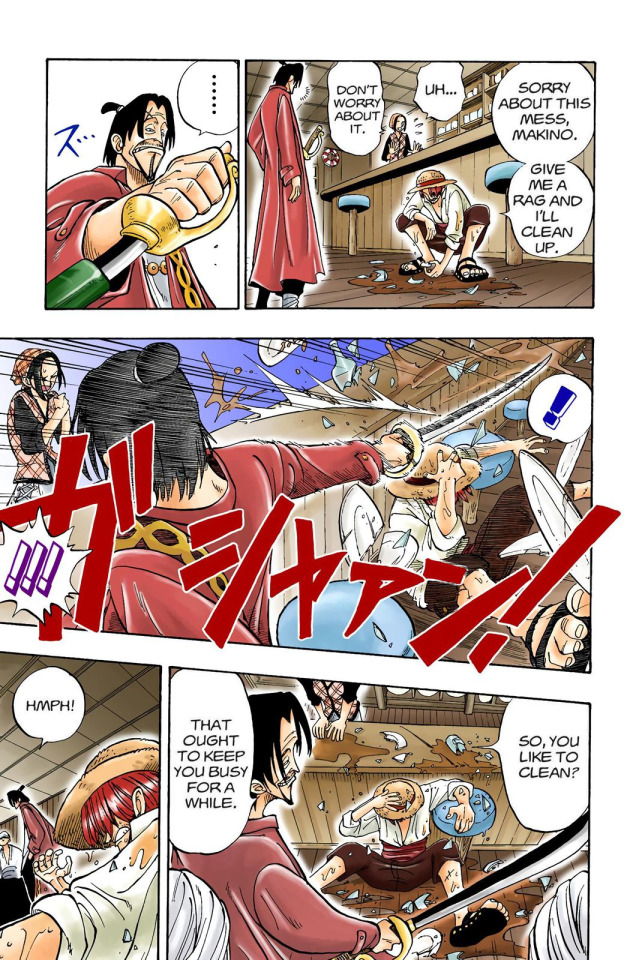
That said, Luffy answering Shanks' "where are you going?" with "to find a real role model" is hilarious. He was getting zingers in even as a little kid.
It's time, then, for the Red-Hair Pirates to discover that Luffy ate their Devil Fruit - one wonders whether they truly did just happen to swipe that one by chance, or if it was intentional, and bound for someone specific... regardless, I'm a big fan of the art in this panel. The tension of the moment is broken comedically a moment later, but there's a surprising amount of emotion packed into the gestures and the expressions here that very much pique my interest. Shanks, one of these days we'll figure out what's going on with you, but for now I can only wonder...

I notice that Luffy also calls other people in the village by their job titles - Mr. Fishmonger, Mr. Mayor. His characteristic bluntness follows, but it's a cute detail. I don't remember the habit persisting - I wonder if it was Ace's bad manners that led to him nicknaming everyone he meets in the future.
Shanks does this a few times within the chapter, which is interesting - a panel where his eyes will be in shadow, and he seems almost foreboding, followed by a panel where he's fully illuminated and seems his usual, much more approachable self. Whether it's simply foreshadowing the fact that he's much more of a heavy hitter than he passes himself off as, or if it's hinting at some deeper aspects of his nature, it's very intriguing.


And for another sequence that hasn't been touched in any adaptations, Shanks standing stock-still while Lucky blows a guy away point-blank, and then a couple pages later you get Beckman putting a cigarette out in another guy's eye. I really hope we get to see more of these guys in action soon.
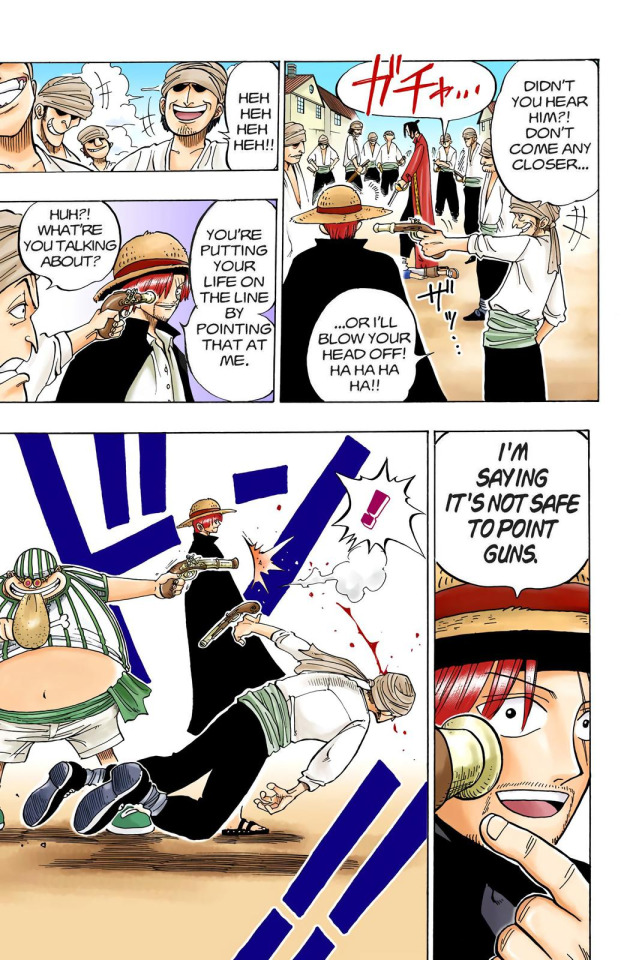

We're all familiar with what happens next - this all started because Luffy, despite being all talk about the Red-Hair Pirates being cowards, told Higuma he was wrong when he said the same, Higuma takes Luffy out to sea, Shanks breaks out Conqueror's Haki hundreds of chapters ahead of its formal debut (and then uses the secret fourth medical Haki to prevent himself from dying in 90 seconds via exsanguination of the brachial and axillary arteries - or something. Don't worry about it).
Something very interesting happens in a lot of emotionally significant moments for Shanks - a lot of the time, Oda doesn't let us see his eyes.
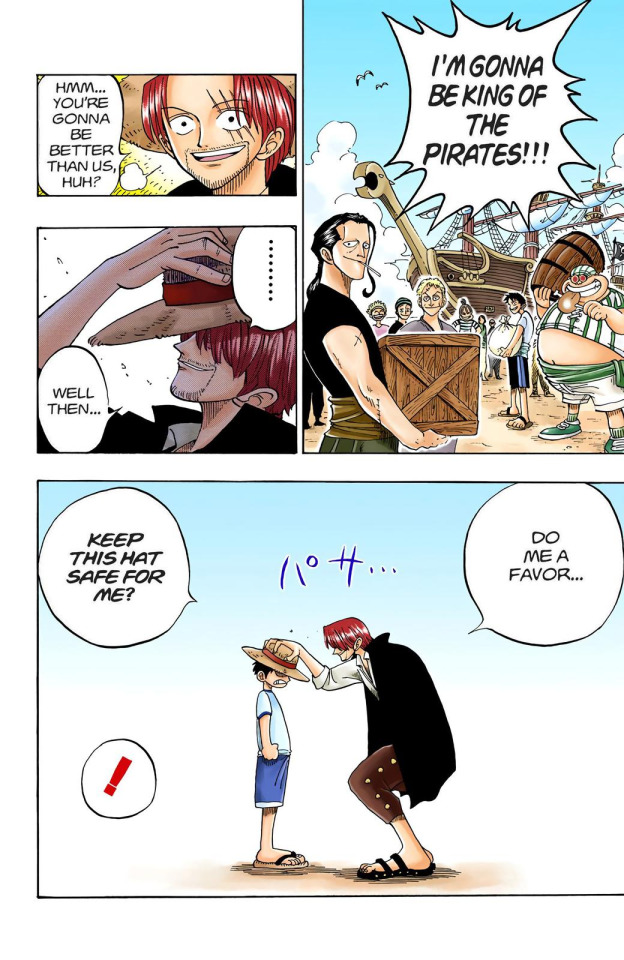
Poor Luffy tries so hard to play up his bravado, but it's already apparent that he doesn't deal well with goodbyes. Still, the stage is set - and the feeling is mutual.

Ten years later, the now-17 year old Luffy makes quick work of the Lord of the Coast and sets out, musing about the things he'll need (any takers on that tenth crew member)?
To me, the funniest change in Luffy from his child self to his young adult self is undeniably the attained nonchalance with which he confronts the things that befall him. On an informed level, we know that this is a Luffy who's spent the last ten years or so fighting lions, tigers, and bears in the jungle, but on a meta level, it works well to affirm what Shanks said just a few pages ago - he says Luffy is a lot like he was when he was a kid, and now, this older Luffy faces things with the same lightheartedness that we saw Shanks very consciously choosing. The explicit parallel between Luffy and Shanks goes a long way to characterize them both, to inform us of the hidden depths of our hero and plant the idea from the get-go that there's more to him than what might be apparent on the surface.


But anyway, down the water-hole Luffy goes - next stop, Alvida.
3 notes
·
View notes
Text
sugar sugar rune anime vs manga
finished ssr so now i'll post these... why was i so invested in making this. it gave me stress digging through the chapters
keeping track of the differences i notice in the anime vs what i've read in the manga
1. chocolat and vanilla's class
in the manga, they were in different classes
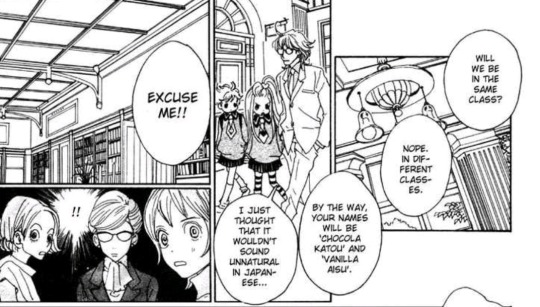

chocolat was in 5A while vanilla was in 5B. however, in the anime, they were both in 5A which i presume was for it to be more convenient to add in filler episodes regarding their school life
2. these pierre scenes
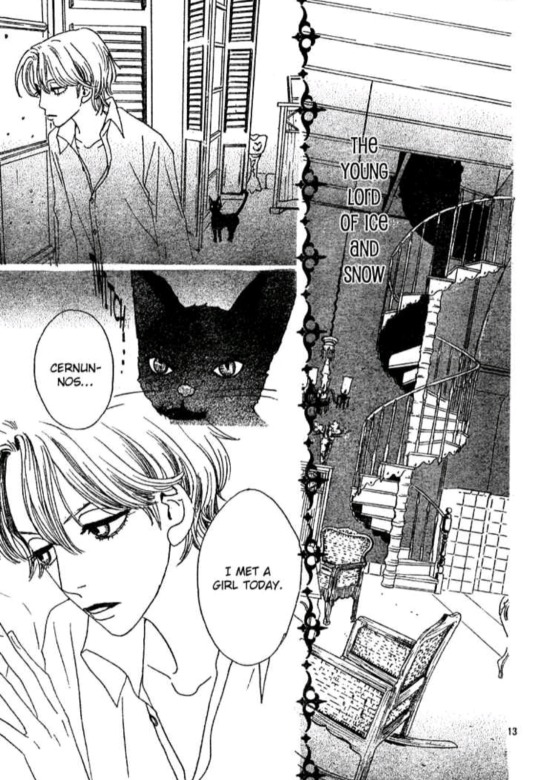

these were from as early as ch. 2 right after rockin robin told chocolat about the piss coloured hearts. it's giving antagonist vibes. as of now, i've watched 4 episodes. haven't seen these animated yet so i presume the anime is just giving him the ~cool, popular senior student~ image for the start of the series, they'll get to the antagonist part later
'i met a girl today.' yeah you met cerunos' (cinnamon) daughter
3. vanilla's first heart(s)
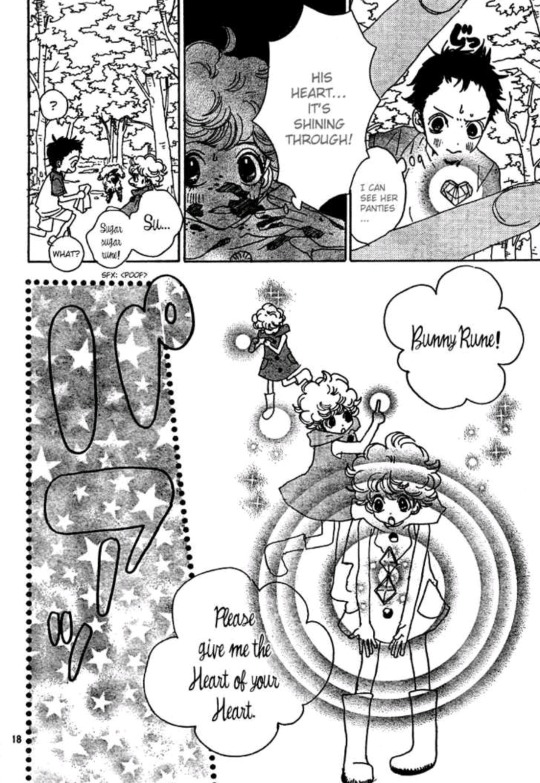
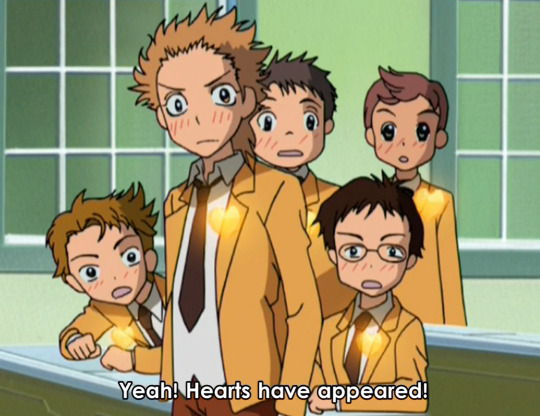
in the manga, it was when she met akira and hiroshi and the reason his heart was orange was bc he saw her panties 💀 idk if this is in the anime but i don't want it. in the anime, she got her first few from some of her classmates after their PE lesson
4. when they got their familiars



in the anime, it was as early as ep 2. duke's first appearance was in ch 5 of the manga when the prank took place. the actual summoning for their familiars only took place in ch 6 after chocolat and vanilla got the basic wand to look further in the catalog.
5. chocolat indirecting pierre
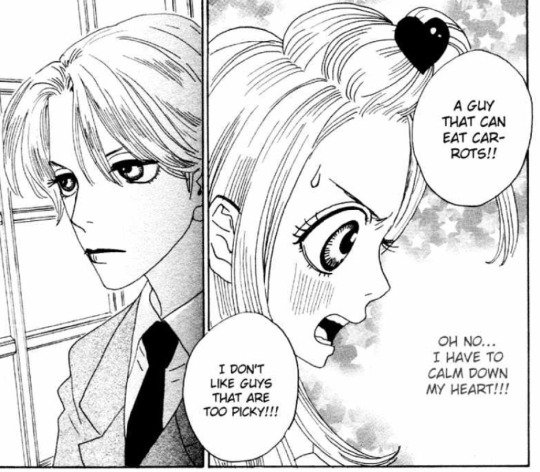

this was during nishitani's interview with chocolat in the manga. unfortunately, we couldn't get this scene in the anime as chocolat had not met pierre during lunch. in the anime, pierre still walks past them during the interview. chocolat glances at him but says she has no ideal type :v
oh and chocolat didn't have to conjure a ghost for him like in the anime he just went back to the club room and everyone made up
6. presence of transformation and wand usage for picking up hearts
i only realised this when they were going through the magic item catalog in the manga and was like 'oh, they didn't have a wand?? fr?' using an example from the manga when chocolat takes nishitani's heart she is seen in her uniform casting the spell:


in the anime, they'll do their magical girl transformation before casting the spell
7. chocolat's return to the magic world
we're going back very early in the anime (ep 7) as compared to the manga (ch 10) we're missing a few things in between regarding the manga. what happens in both media was totally different though like in the anime, vanilla also comes to the magic world to save chocolat and chocolat gets cinnamon's diary from queen candy. but in the manga, she learns about the ogres. also in the manga, cinammon's diary was seen with chocolat in ch 1 so we can infer that it has always been in her possession
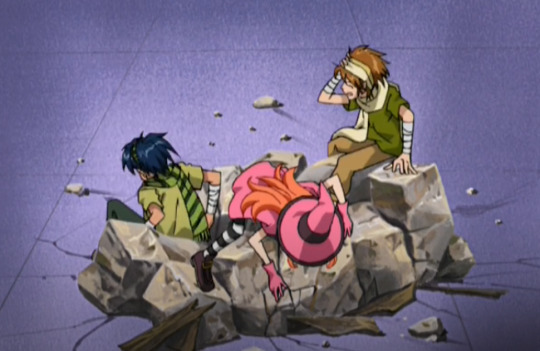

8. when a green heart is introduced
in the manga, it was shown in ch 23 and in the anime, it was in ep 9 (quite the jump but it's quite fitting for akira's relationship with chocolat)
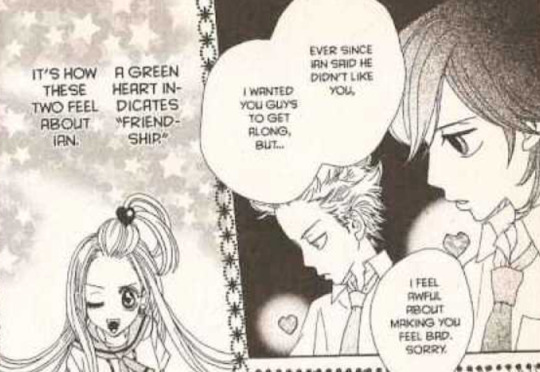

9. timing of when houx and saule join moegi academy
manga: sometime after vanilla joins the ogres
anime: after the anime-exclusive midterm when chocolat organised the sugar rune festival ft. bonus tennis match against pierre


10. the heart-shaped hairpin
in the anime, chocolat bought it from the magical catalogue when vanilla told her about the item but in the manga, it was a gift from queen candy from the time when chocolat crashed the palace roof.


vanilla was supportive of chocolat in the anime since she wanted to help her friend. her behaviour was the opposite in the manga as 1. it was something from queen candy and 2. chocolat's sudden appearance ruined her own chance to get sasaoka's heart

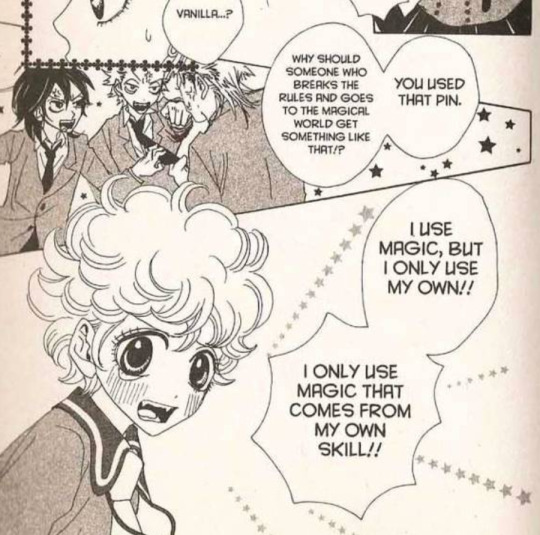
chocolat's self realisation that she needs to put in effort in the manga vs how she needed robin to point it out for her to realise it in the anime
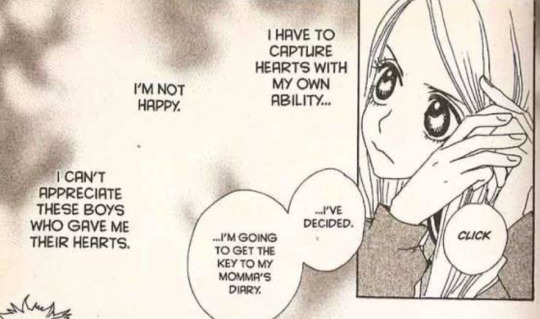
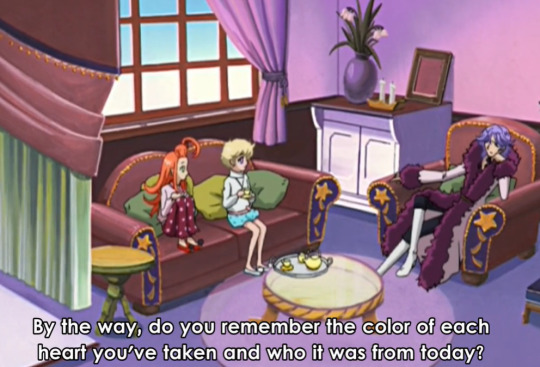
5 notes
·
View notes
Text
Why I am Predicting a Beth Appearance by the End Episode 3:
@bookqueenrules:
OFC, this is TOTAL speculation based on TWDU and non-TWDU clues. I am NOT saying that Daryl will necessarily see/know that she is alive by the end of ep. 3(or in a post credits scene), but I believe it will be revealed to the audience by then that she, or someone who looks like her, is alive.
I’ve seen symbolic clues in “Diverged” in Season 10 and Dead City.
DD was in the writing/development stage FAR longer than Dead City. So, Dead City writers already had access to the outlines for DD before production began. So, when Maggie showed a family picture with a person we can infer to be Beth having eyes gouged out in the shape of the surprised emoji, that was a major red flag for me. That happened in episode THREE of Dead City.

In Diverged, a wholly symbolic episode, Daryl takes off on his own and his motorcycle breaks down. It is in the THIRD place he looks, that he finds the knife, symbolically representing a love interest. he needs to fix his bike and continue his journey.
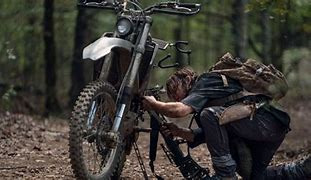
Some of my belief is based on storyline conjecture. So, back to Dead City. It was considered a success by most, but why did it do well?
Some wanted to see NYC zombies. Some wanted to see Maggie and Hershel. I would argue MOST wanted to see the development of the Negan/Maggie dynamic. How many would have watched just Maggie trying to get Herschel back? Some, but it would not have had the same viewership, and the TWD fans actually care about Hershel as Maggie and Glenn’s son.
So, why will people watch DD?
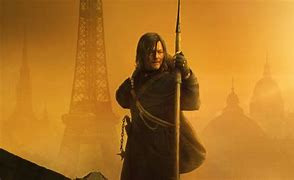
Some are looking forward to variant zombies, some want to see Daryl, but for how long will the average American TWD viewer tune in to see Daryl hanging out with new French characters with accents and subtitles to boot?
Personally, I would enjoy it regardless, but I know many people that hate subtitles and won’t be particularly interested in how things went in France. Sure, the scenery is beautiful, but it won’t hold the interest past a couple of episodes. The “cure” premise was JUST seen in The Last of Us. TPTB should also have learned that the decline of the flagship was largely due to killing off “family” characters we cared about and bringing on lots of new characters that never became as important to the audience as the original characters of the first few seasons. Hopefully, TPTB learned this lesson.
While I DO expect to see a Carol flashback in season 1, the show will need to bring something to the French story that will excite and surprise viewers. If MMB would have decided to be in season 1, it may have been a different story. The Daryl/Carol dynamic would have been there, and I would be predicting your typical “cliffhanger” style reveal towards the end of the first season.
That is why I think there will need to be SOME reconnection between Beth/Daryl in season 1 for the audience to care enough to tune in to Carol/Daryl finding her in season 2. I wouldn’t expect them to connect until late episode 4 or episode 5, but they will have to be separated again by the end of 6. They will need that time to tell their story and have the audience care again about their connection. Nicotera said in a recent interview that the DD spin-off talk began 7 years ago. It was supposed to be set in the American West where Daryl encounters different groups each week. He referenced three OLD shows as examples.
One was Kung Fu with David Caradine.

I could go into detail, but each show he referenced is about a man who is searching for something/someone and encounters different people who they change and are changed by them before moving onto the next place on the search. Yes, I had to research each one. They were before my time! This stretched out search for Beth would have made sense then because the audience still remembered her and their connection vividly. That will not work now. It’s been too long and these series are finite. Gimple, sort of, said as much on the red carpet at the finale of the flagship. He said he was already past the spin-offs in his planning and was now thinking about how to develop the next generation and new stories while integrating the “iconic” characters. So, I don’t think these spin-offs will go much past three seasons. Especially with only six episodes per season, it doesn’t give that much time to develop these stories.
Some non-storyline clues are that the release of EK’s album is on the 22nd of September right before episode 3 airs. She has been releasing singles all summer. Why wait for the album release until then? Norman said in interviews last year that he would, “run into some familiar faces” in the spin-off. Who else is going to run into in season 1 in France?
Just a few days ago there has been even MORE weirdness. An extra-long first episode? All of episodes 1 and 2 being screened in theaters in four major cities on Monday? WHY? I almost wonder if they decided to reveal Beth is alive at the end of episode 2. The ONLY reason to prescreen is to increase buzz, but really what hasn’t already been teased about those first two episodes? I understand that they may need more publicity due to the writer/actor strikes leading up to the release, but why would “spoiling” the first episodes really increase the buzz if it is JUST about the Laurent story?
I’m excited to see how it plays out!
@twdmusicboxmystery:
I absolutely LOVE everything you’ve said here. Love the symbolic clues you’re looking at. Love your points about Dead City. Love your research into early iterations of the DD spinoff. (I kinda wonder if all the New Mexico symbolism from 11x01 was a nod to that.) Love all your points about publicity and such.
And you’re right. I heartily agree. I don’t have much to add, but all of your conclusions are the only thing that make sense. The only other “faces” we could run into are people like Heath and Davon. And don’t get me wrong, it would be fun to see them again. But it’s not like any of those characters will do much to further Daryl’s story.
And let’s not forget that ep 1 starts with an echo of Judith’s line about Daryl deserving a happy ending, too. Which means that one way or the other, he’ll find his true love and soulmate in this spinoff.
Can’t wait! Thanks SO much for your thoughts! Xoxo! 🍁 🍂 😍
#beth greene#beth greene lives#beth is alive#beth is coming#td theory#td theories#team delusional#team defiance#beth is almost here#bethyl
8 notes
·
View notes
Text
E.A.R.: Season One Round-up
⚠️ Please note that this season includes the episode “Charlie Got Molested”, in which several sensitive terms are used, as per the title. Discretion is advised.
So now I have finally finished S1 of It’s Always Sunny, I am here to present you with my notes from the season. The majority is of Dennis and his actions, with some additional notes on Mac as well.
Keep is mind I intend on keeping these round-ups brief, and as such I may not share all of my notes, simply the consensus of them. And with that, we have:
“The Gang Gets Racist” (1x01):
Dennis is weirded out by Terrell looking him up and down.
Dennis naturally attracts gay men when the pub becomes a gay bar. It’s assumed that Dennis gets the most tips during this time.
◦As such he then embraces the attraction. This could be seen as him valuing money despite his wealthy background (perhaps a season one-exclusive ideology), perhaps in excess, and — as Dee even points out — vanity.
Mac tricks Dennis into getting blackout drunk but pretending to being unable to follow directions over a tequila-and-lime salt lick.
◦This shows their closeness and manipulative undertones early on.
◦This also shows how Dennis perceives Mac as dumb, whilst Mac was able to trick him.
It’s at first inferred that actor friends of Dee’s are used to trick Dennis into believing that he had sex with them (actually, them with him, while he was absurdly inebriated). It later turns out that the actors couldn’t make it, and that this actually happened.
“Charlie Wants an Abortion” (1x02):
Dennis goes with Charlie to his supposed son’s house. He tries to support him, somewhat.
Then, the mother of Charlie’s “son” then asks if the two are “together”.
◦This, like natural Dennis’ attraction of gay men, could later foreshadow his close relationship to Mac and Mac’s crush on him.
◆ While Mac’s “thing” used to be remarks about his “questionable sexuality”, Dennis’ could have been incorrect assumptions about him and Mac/Charlie.
◦Additionally, the prostitute at the blood testing clinic also assumes that Charlie is Dennis’ boyfriend in the next scene.
◆ When he then denies the prostitute who later offers to blow him for ten dollars, he then insults her to Tommy when she can still hear him.
When Charlie advises Dennis not to engage with Tommy as he had just done, Dennis disregards the advice and proceeds to engage him anyway. This shows social ignorance and hardheadedness.
When Mac later reports that pro-life chicks are “dirty/freaky”, and Dennis is convinced to attend a rally with him, Dee asks him if he’s “really going to throw away all of [his] convictions for a chance to get laid”, to which Dennis replies, languidly, “I don’t really have any convictions.”
◦This appears to be the first suggestive highlight of Dennis’ detachment to social and political views.
Dennis thinks that it is appropriate to hit on women at (the pro-choice side of) an abortion rally. After a failed attempt he retries. This seems to be the start of Dennis’ inappropriate behaviour, particularly towards women, during the series.
◦After two women reject him, he approaches Dee and claims that he thinks that all the women there are gay.
◦He then promptly switches sides.
“Underage Drinking: A National Concern” (1x03):
Dennis is the first to ask why weren’t they carding (asking for IDs). The rest of The Gang says that it isn’t their job, to which Dennis replies, “It’s everyone’s job!”. This could raise the question as to why Dennis wasn’t carding himself.
In this episode, we see the first instance of what we will later discover to be Dennis’ false recollection of his middle/high school popularity.
◦Mac and Charlie then point out that the only reason Dennis ever had a girlfriend in school was because he always went after freshman, because he’s “always had a creepy thing for younger girls”, which Dennis contests.
◆ This demonstrates his need for control for the first time in the series. This need for control presumably comes from his molestation by the high school librarian.
Dennis is then later easily seduced (this does not lead to sex) by Tammy. This is presumably the first time in the series, beyond Maureen Ponderosa, where Dennis has been the one seduced/pursued.
After getting the go-ahead from Mac and Charlie, Dennis immediately embraces Tammy’s advances. This could suggest that the only thing on Dennis’ conscience over begging with Tammy was his friends’ ridicule, and not her status as a high schooler.
“Charlie Has Cancer” (1x04):
In the opening of the episode, Charlie says that he’s been crying. Dennis replies with an awkward laugh, “Oh, I’m sorry,” but it’s obviously insincere.
◦Even after acknowledging that Charlie has been crying, he then goes, “Oh, and I thought my place looked like shit,” when stepping into his apartment. This demonstrates an emotional detachment as he’s set on getting the basketball that he’d come for.
Dennis’ immediate reaction to Charlie informing him that he may have cancer is “W-What?”, but then as Charlie starts to talk about it, he asks, “Did you want to talk about it, right now?” which shows that he is relatively uninterested. This could suggest that his initial shock was due to being taken by surprise, and not out of empathy or sympathy. After some back and forth, the two stand in awkward silence.
In the next scene, Dennis then lies to Dee and Mac that he Charlie “cried together and [he] held him for a while”.
Mac and Dennis then concoct a plan to cheer Charlie up by finding him a woman to look after him. When Dee declines to help, Dennis calls her a “pain in the ass”.
In an effort to put his plan into motion, Dennis exploits Charlie’s sickness by referring to him as “sick and injured” with no remorse. This shows that the plan is to make Dennis and possibly Mac feel better, under the guise of it being Charlie.
To get Dee in on the plan, Dennis promises that she can punch Mac in the face. He makes this promise with seemingly no remorse.
◦Additionally, he sided with Mac for punching his sister during the Christmas party.
Dennis quickly discards his plan to help Charlie for what he believes to be “a hot new waitress”. This shows that most of his morals are like paper, and that he thinks of himself first and foremost.
Dennis shames Mac for planning on going out with Carmen.
When Mac voices his plan to tell the Waitress that Charlie has cancer, Dennis vetos it immediately. When asked what he would rather do, Dennis hesitates before the scene cuts and he is doing what is essentially Mac’s plan, but moderately softer, perhaps more flirtatiously. This results in him getting with the Waitress despite him knowing that Charlie has a crush on her.
◦After this, even when Mac points out that Charlie has liked her for months, Dennis hardly shows much remorse.
When Dee asks for help carrying a keg, Dennis declines with an easy lie without even sparing a glance.
Dennis’ reaction to Charlie telling him that he doesn’t have cancer is very similar to when he was told that he had it.
◦He then gets angry at Charlie for lying (which he then admits that he was). This shows that, like any other person would, Dennis feels betrayed at being lied to, feeding into the “I have feelings” speech from “The Gang Tends Bar”.
“Gun Fever” (1x05):
The episode opens with Mac making fun of Dennis’ health drink, asking if it will help erase the damage he caused to his liver the night prior. Dennis digs back with if Mac’s coffee will help him forget the whale he slept with the night prior.
◦This remark could come across as unjustified.
◦This also feeds into Dennis’ view on women, calling the “whale” gross and even suggesting that she had diseases that might have spread to Mac.
Mac says that if Dennis lowered his standards “a little bit”, then maybe he would get laid more.
Mac and Dennis find that Dee “has the worst taste in men” when Colin makes his first appearance. Dennis even calls him an “80s stereotype”.
When Charlie mentions that last week, Colin had his hands down the back of Wendy’s (a bartender from another bar) jeans, which Dennis replies with “Gross.”
◦Perhaps this could suggest that Dennis is disgusted by PDA.
Dennis finds it gross when Mac makes a remark about Dee potentially sleeping with Colin.
◦It is at this point that Dennis works out that Colin is the safe thief.
It’s actually Dennis who intends on reprimanding Colin outright as opposed to Mac. Dennis then goes along with Mac’s plan to “trick” Colin.
Dennis is the one to shoot Charlie when he steals money from the register. He is clearly apprehensive to use the gun, as he runs forwards and shoots with his eyes closed.
Dennis is reluctant to drive Charlie to the hospital as he “doesn’t want bloodstains all over the interior” (of his car). He then ‘compromises’ by suggesting that they put a trash bag over him.
“The Gang Finds a Dead Guy” (1x06):
The first line of the episode from Dennis is his first thought over the dead man: a sarcastic, “Well this ought to do wonders for business.”
◦He is also more concerned about the mess than the death, as is the rest of The Gang.
Dennis is the first to jump in to stop Charlie’s power-washing method with facts about spreading germs. This could show that he is built to be the most logical out of the group.
Mac and Dennis fight over who owns the pub when Rebecca (a conventionally cute girl) asks for the owner to discover where her grandfather had spent his last night.
Mac starts talking about her grandfather, and she asks if he knew him, to which Mac starts to disagree, but Dennis jumps in, easily, with a “I knew him pretty well,” so that her focus may be on him. He also says before she leaves that he has some “pretty incredible stories about [her] grandfather that [she] will just not believe”.
When Dee seems concerned over the death of the girl’s grandfather, saying it reminds her of her and Dennis’ own grandfather, Dennis shuts her down, saying that Pop-pop is an asshole and that he bets Rebecca’s grandfather is too, and that “People don’t just abandon their parents for no good reason.”
◦Charlie passively disputes this.
◦Later, Dee asks Charlie to visit their grandfather with her because Dennis won’t go.
When Rebecca comes in to find the two bickering, and asks if it’s a bad time, Dennis immediately swoops in with a lie, saying, “We were just talking about your grandfather. Emotions are running very high here today. (…) I try not to think about me, in these circumstances, though. How are you?”
When Rebecca asks for a favour from Mac and Dennis (putting together a memorial service), Mac is the first to jump in. Dennis doesn’t answer until Mac says that it may be difficult (to find people who knew her grandfather well), to which Dennis jumps straight in saying that he knew many of his friends, saying, “It’s not gonna be hard for [me].”
Dennis’ plan for this is to go to the homeless shelter and pay some men to attend the funeral. Even Mac says that it’s shady. Dennis replies with, “If you wanna back out now, go ahead. I’d be happy to take all the credit for this,” to which Mac refuses despite his convictions with the scheme.
◦In addition to this, Dennis is the one to ask an encroaching homeless man if he’d like to make twenty bucks. When the man agrees, he then asks if he has any nicer clothes. There is an awkward amount of time before he and possibly Mac realise what he had just asked.
◦Later, Dennis (and Mac) take five homeless men to Rebecca’s grandfather’s memorial, under the pretence that they were close friends of his.
Rebecca asks Dennis and Mac to give a speech, to which Dennis says that he has something prepared, shocking Mac (proving his previous statement a few scenes ago about being one step ahead), and then going even further to embarrass/foil Mac by saying that he’s a terrible public speaker.
◦He also goes into additional detail about this and ends the list of embarrassing symptoms with, “His third grade stutter comes back, it’s adorable.”
When Mac asks to borrow Dennis’ car to go to Charlie’s “emergency”, Dennis says, “You can’t, you’ve been drinking.” After Mac leaves with a grunt of frustration, Dennis then turns to Rebecca and tells her that Mac “has a bit of a drinking problem”, proving that he can so easily throw his friend under the bus.
◦This is also proven to be ironic later in the series.
Dennis then lies his way through his speech quite naturally, using some clichés like “He was a bit of a curmudgeon, but he had a heart of a lion.”
◦Dennis also throws in an anecdote about Lionel (Keane) wanting to give and so he persuades him and himself to go down to the mission where they “fed every last poor, miserable, precious soul, but [also] washed the feet of every man, woman, and child there in the spirit of Christ”.
◦He finishes the whole speech with a wink to an honoured Rebecca.
Dennis then goes back to the bar where he finds Charlie and Dennis burning the nazi uniform (paraphernalia unbeknownst to him) and then asks Mac if he’d like to know about that girl. Mac declines repeatedly but Dennis continues to taunt and egg him until Mac admits defeat and gives up. Dennis says that he doesn’t get to give up as they went “head to head” and that “he won fair and square”. He then proceeds to explain at an aggravating pace about how he and the girl went home and “sweet, passionate love”.
◦Then, Mac hands Dennis the photo of young Pop-pop and tells him that his grandfather’s a nazi, breaking Dennis’ spirit upon finding out that the picture looks like him.
“Charlie Got Molested” (1x07):
Upon discovering the newspaper headlines about Mac and Charlie’s former P.E. teacher, Dennis (and Dee) show concern, even calling it “awful”. When Charlie leaves in a rush, Dennis concludes that he, too, was molested by the teacher.
◦This immediate accusation is popularly surmised to be a byproduct of Dennis’ own molestation in middle school by the librarian Mrs. Klinsky at 14. (“Takes one to know one”).
Dennis tells Dee that the first step to dealing with molestation is understanding. Dee disputes that it’s acknowledgement, meaning that some of the things that Dennis may say in confidence aren’t always true or can be disputed, especially in the region of psychology.
Dennis mocks Dee’s idea of giving Charlie an intervention and inviting his whole family to it.
Dennis shows dismay/disgust at Mac focussing on whether or not the abused kids were “blown”.
After Mac rushes off to his bedroom due to the prior point, Dennis and Dee follow him, though Dennis is the one in the lead, and the first to ask if he’s okay.
When Mac is upset over “not getting blown”, Dennis says, after some silence, “You’re goin’ to hell, dude.”
◦Perhaps this aligns with the theory of Dennis assigning his own trauma/molestation onto the situation?
Dennis and Dee follow Charlie to the McPoyle’s apartment, which demonstrates a lack of boundaries in the group (as we know).
Surprisingly, it’s Dee who wants to “drag [Charlie] back to the bar and tell him that they know he got molested” whereas Dennis wishes to take the softer approach and “ease him into it”.
◦THIS IS IMPORTANT. Perhaps this is the tactic that Dennis would like to be used on himself?
Dee says to Dennis, “You have no room to talk, all the girls you’ve molested-” which Dennis stops her and says, “Woah, woah, don’t start throwing that word around like it’s meaningless, okay? This is serious.”
◦The fact that Dennis adds, “This is serious,” could infer that he doesn’t take such a claim seriously unless it was to harm him in some way (hence the woah-ing).
◦Unfortunately, this claim could also be seen as true. Dennis’ hypersexuality and controlling tendencies when it comes to sexual relations (especially later in the series) could be an attempt for his subconscious to regain control since Mrs. Klinsky.
When Dee and Dennis go find Charlie at his mother’s house to try Dee’s plan, Dennis says that he thinks that it’s a terrible idea.
When Bonnie starts hyperventilating over the news, Dennis is the first to ask if she’s okay.
At the end of the episode, Dennis is smoking a cigarette down to the butt. He’s mostly holding it.
Additional Mac Notes:
(1x01) Seeing as their hateful “frenemy”-esque dynamic is yet to be thought out, at the end of the episode Dee and Mac are sat alone drinking together in the bar counting their earnings of the night ($114).
(1x02) Mac is immediately attracted to the Pro-Life Centre’s secretary, Megan, indicated with a “Hoo, mama.” This must indicate this season is set “before he was gay” (consecutively, not canonically).
(1x02) Mac signs off his and Dennis’ phone call with “Later, gator.”
(1x02) Mac’s morals seem to be easily abandoned when they put himself in jeopardy. (I.e. Abortion is right when he may be the father.)
(1x03) At the high schoolers’ party, Mac is playing beer flipping / flip cup. After several failed attempts he finally lands one and appears to be a sore winner.
◦The irony here is due to how many attempts at flipping his cup that Mac fails at, as in “The Gang Reignites a Rivalry” (5x12), Dee is continuously chastised by the rest of The Gang for being terrible at flipping cups.
(1x03) Out if the entire Gang, Mac is the only one without a prom date.
◦This could perhaps suggest that he hadn’t a prom date for his own prom, which could be why he slept with Dennis’.
◦There is also the possibility that due to his initially closeted status and crush on Dennis, most of not all of the girls that Mac would pursue would have to have something to do with Dennis (i.e. His mother, his prom date, the Waitress, etc.).
(1x05) Mac’s immediate reaction to the breaking and entering (and everything in the safe stolen) is, as though it is obvious, “to buy a gun”.
(1x06) In the opening conversation with Dee, Mac disputes that he break Tom Brady’s arm, then saying, “No more super bowls for that pretty boy.”
Additionally, I made a tier list for the season’s episodes:
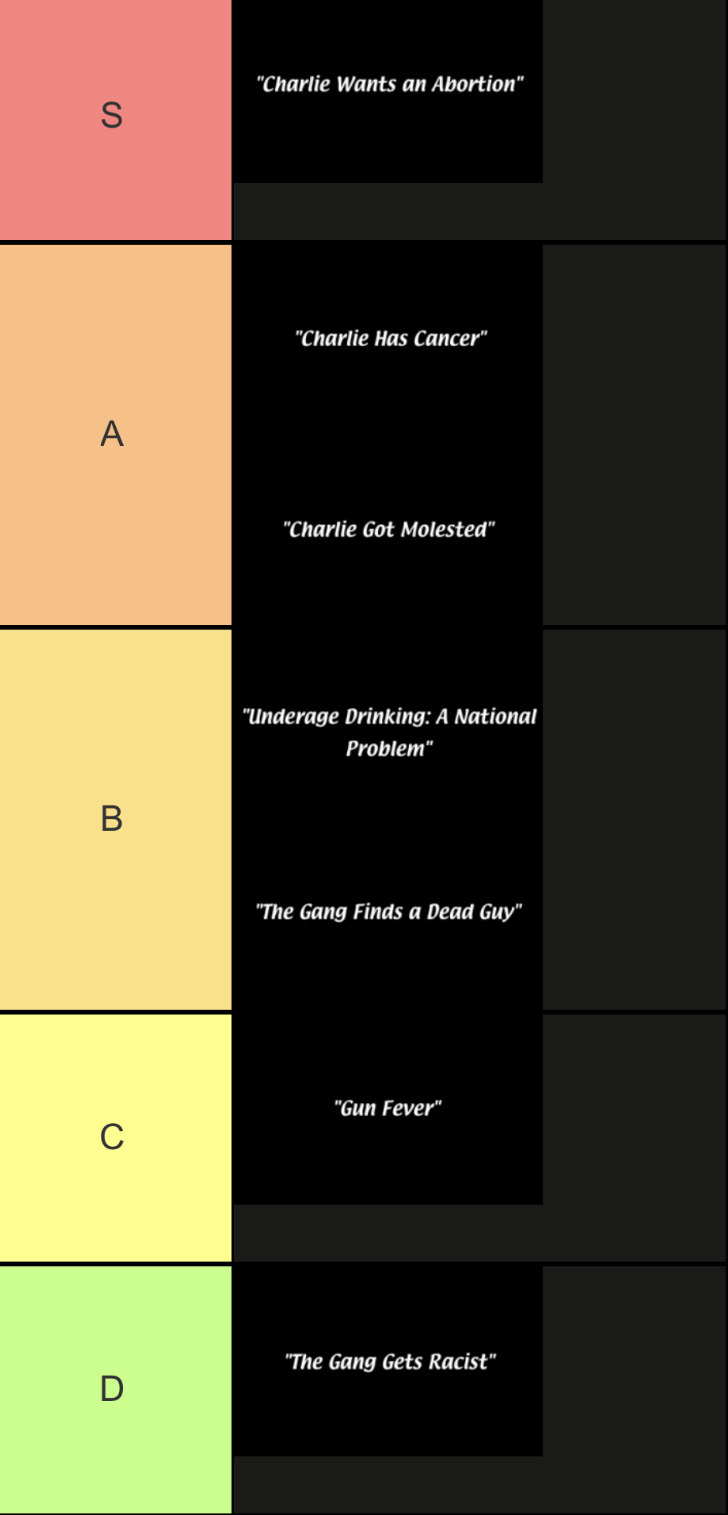
You can find the Tier List here.
#it’s always sunny in philadelphia#iasip#dennis reynolds#mac mcdonald#sunny s1#em’s analytical rewatch#macdennis#mac x dennis#season round up#original post
8 notes
·
View notes
Text
the world we make, by n. k. jemisin: three and a half out of five hot dogs
the world we make is a contemporary fantasy by hard-hitter n. k. jemisin. it's the sequel to her previous novel the city we became, a love letter to new york. this sequel isn't quite as tight as the first book, some episodes go a bit flat -- feel a little too fictional, you know how it can be? just comes across as too pat, too easy to feel realistic. but that's the only flaw that i can think of, and the majority of the book is sharply written and engaging. with that said, it's probably the weakest jemisin novel i've read ... the ending especially feels a little too sudden and unearned. but put that in perspective, right, it's a jemisin novel, it's great! you're going to love it.
the world we make takes off from the ending of the city we became. i'm assuming that, if you've read this far and know that this is a two-book series, you will have at least inferred a few things -- at least some of the characters live through the last novel, right, so let me invite you to consider the sequel with some mild spoilers for the first book.
the central characters of nyc have congealed as a city. in this novel, they settle into their new social sphere as a clique and attempt to situate themselves relative to the rest of the world's cities. looming (literally) in the background is r'lyeh.
squatting over staten island.
this was originally going to be a trilogy. i wonder what jemisin had in mind ... especially because some events go down near the end of the novel that totally bust the city-sphere magic out of the underground and into the actual-factual limelight. but apparently the theme of the alt-right lurching into the political mainstream got too real and too soul-crushing to dwell on. as it happened, though, she packed the questions of how nyc would connect with the rest of the world's cities and how they would deal with r'lyeh into one novel.
weird thing: jemisin never deals with the most famous inhabitant of r'lyeh, cthulhu. just a weird thing that doesn't happen.
this novel is a bit of a landmark in today's attempt to blend contemporary science with storytelling. the effort to render visual elements of multiverse theory is well-placed, and the effort to imagine the kinds of antagonists that would be relevant to a multiversal conflict is admirable. like i said, some episodes in the story fall flat, but overall the characters sparkle, the setting is vivid, and the events are rich as a japanese curry. i recommend the pair of novels, especially the first one -- but once you read that you're going to want to go for seconds. overall
three and a half out of five hot dogs
#the world we make#n. k. jemisin#book reviews#book review#review#reviews#fantasy#science fiction#queer lit#scifi
3 notes
·
View notes
Text

Called it. Big guy whose name I didn’t bother to remember totally called for an Abomaton back-up. You can see in the background that both Edric, Barcus, and Mattholomule have been incapacitated, and so has presumably the rest of the resistance.
I don’t know if it’s just the framing of this shot, with the Abomaton in the doorway like this, or if this thing is supposed to be bigger than the standard models we’ve seen. Either way, it does a great job of telling us, the audience that this is bad news.
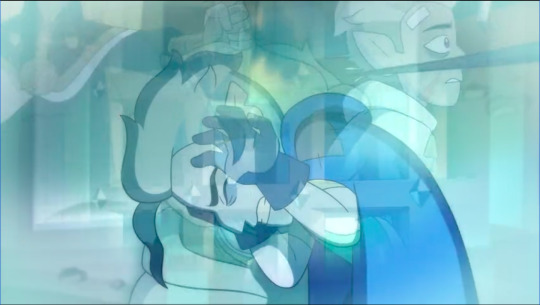
When hunter comes in contact with Gus’ sphere, he is assaulted with flashbacks to previous episodes. Most prominently Hollow Mind, but also Hunting Palismen.
So it seems that whatever it is Gus is doing, it can show a person unpleasant memories from their past, not just his own, like I initially thought. So maybe there wonät be a secret super tragic backstory to Gus after all… I hope.
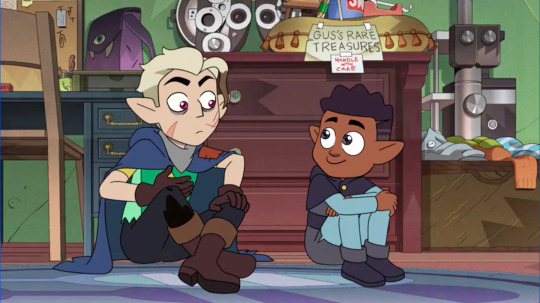
Okay, not a secret tragic backstory, thank the Titan. i think the present and near future hold more than enough trauma for Gus, no need to inject some into his past.
This was such a nice scene between Hunter and Gus.
We’ve seen before that Gus struggles a lot with feelings on inadequacy (I can’t believe I spelled that word right on the first try) and self-doubt. A lot of it seems to come from him being considered a gifted kid, naturally skilled in a particular magic, to the point where he moved up a year in school.
As we saw in the flashback at the beginning of the episode, this led to some other students taking advantage of him. We can infer that when he moved up a year, he lost the friends he had previously, which left him a very lonely kid. That was until he met Willow, who was a genuine person that didn’t just befriend him for his smarts.
To make things worse, I get the feeling that he may also suffer a bit from imposter syndrome. Imposter Syndrome is basically when a person doubts their own talents or skills and it often comes with a fear of being exposed as a fraud. Gus was told that he was talented and smart, but all he could see was all the times he screwed up or made a mistake or when he got tricked.
He got tricked by his fellow classmates, he got tricked by… whatsherface… Bria! Bria and her gang tricked him to help them find the Looking Glass Ruins. And now he got tricked by Adrian’s illusion of Willow.
So from Gus’ perspective, he is nowhere near as smart or talented as people keep telling him and he blames himself for that. But of course he makes mistakes, he’s a kid. Heck, most adults struggle to keep themselves together. Not me though.
To draw some parallels to Hunter: Belos kept telling him he was special and the Titan had great plans for him, that he was gifted in that sense… when in reality, all he ever wanted was to keep Hunter loyal and from asking any questions. His lot in life was not to reason why, but to do and die.
What was it Hunter said in Eclipse Lake? ”There is nothing worse than disappointing someone who thinks you’re special.”
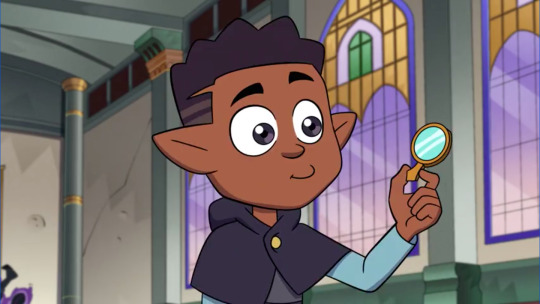
Gus pocketing Adrian’s amplifier mirror thing will probably be important later. It’s a surprise tool that will help us later!
(the next shot immediately after this one shows the Abomaton destroyed, the big guy glued to the wall, and two students that weren’t there before have joined in on the festivities. Adrain is nowhere to be seen)
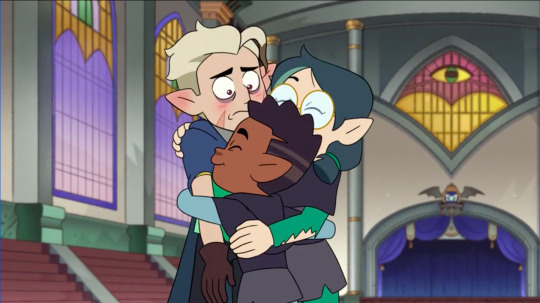
Hunter, much like Eda did at the beginning of the series, doesn’t know what a hug is. Which makes sense, Belos isn’t exactly the affectionate type. Honestly, Willow & Gus should be happy Hunter didn’t think it was some kind of wrestling grab and his combat instincts kicked in.
14 notes
·
View notes
Text
Whitechapel series 4 press pack
Rupert Penry-Jones is Detective Inspector Joseph Chandler
What can you tell us about the new series?
There’s lots of scary stuff going on! I think what they realised from the last series is that people really enjoyed the scary, suspenseful elements of Whitechapel not just the horror - though there is still going to be some gore of course.
The new series has three separate stories like the last one did, but this time we also have this kind of dark, psychological thing that each character has to deal with across the entire series. Everyone is being spooked in one way or another and we don’t know whether it can be explained logically or whether there’s something else going on. One of the dangers of a long running show as a regular is that the guest stars get all the fun stuff to do, so now we have this story through all six parts its great, much more rewarding as an actor.
What about the first story in particular?
The first story is about somebody who is killing ‘witches’. It’s not about witchcraft as such, but it touches on whether witches exist. Also, Chandler has recovered from what he went through last series and he seems to be stronger than ever. His OCD seems to be under control for now.
So there’s no new love interest for Chandler this series?
No, he’s no longer interested. It’s not worth it for him. Everyone was very adamant they didn’t want to harp on about the last series, so we’re starting a fresh, but he still thinks about her [Morgan, who was killed at the end of the last series].
Does this series feel darker than the last three?
So much of the show is how they edit and light it so you don’t actually get a feel for how dark it is until you see it. It’s always a lot darker than we think it’s going to be. The story that Steve Pemberton has written is pretty frightening actually – it’s like League of Gentlemen but with fewer laughs. Pretty gory stuff!
Do you ever get scared after filming some of the darker scenes?
I don’t ever get spooked when I get home after a day’s work because of what we’ve been filming but I do get scared watching them! When I watched the episode last year where the guy was hiding in the walls I did actually go round my home and check that everything was locked. Whilst I was doing it I thought – I can’t believe I’m doing this, but I had to check!
What do you think it is that people like about being scared?
It makes you feel alive I suppose, it’s nice to have a thrill. As an actor it’s the same as comedy, you get just as much of a thrill making people laugh as you do scaring them.
Did you have any idea how popular Whitechapel would become?
Not at all. It’s one of those rare shows that seems to get better. We all feel it’s getting better the longer we do it rather than doing something that becomes repetitive and boring. It keeps growing, so long may it continue.
What is it like playing a character with so many eccentricities?
It is fun to play with the OCD aspect of Chandler’s character. It’s great to have something like that to express emotion. I don’t want to be disrespectable to people who have OCD though, it can be a horrible, debilitating illness. It can’t be made fun of and we have to be careful how we handle that.
Do you see any OCD traits in yourself?
I think I only have a few OCD traits personally but my wife definitely thinks I have many!
What can we expect from Chandler in the new series?
We start to find out about Chandler’s childhood and background, where he’s from and who his parents were, which is interesting. We don’t know too much yet but it is inferred that there are reasons for why he is the way he is.
Is Chandler part of the team now?
Yes, to be honest they still take the mick, he is still weird, but he has gained respect I think.
Steve’s written the middle story is that something you would be interested in doing – being behind the scenes?
It’s not something I’d want to do right now, I’m fulfilled at the moment acting. I’d like to be involved in something from the beginning, from the conception, so producing perhaps.
Do you have to enjoy the dark side of things to do a programme like this?
Not really, I mean Llewellyn [Claire Rushbrook] is the autopsy specialist and one of the most squeamish people I’ve ever met. We had a sequence with a dead rat and it’s not really a rat – it’s a cuddly toy made to look a bit dirty, but she had to take time to pull herself together. She is terrified of gore and corpses, whereas we’re there taking pictures on our phones!
Have you done any research before filming Whitechapel?
I did some research into OCD before the second series. I spent some time with a doctor.
Would you like to branch off into movies?
I would like to do movies but I just don’t have the time at the moment and the only way to get the time would be to give up two shows that I really like. I’m responsible for my family too and you’ve got to make the money, so to walk away and take the risk on America, I’d be crazy to just give it all up and go.
What’s it like to be so immaculately dressed all day?
I love it! (laughs) I had a brilliant idea this year that one of the things about Chandler and his OCD is that he no longer wears different clothes. He wears a white shirt and the same suits all the way through which means I don’t need to keep going up to my dressing room and changing! So whilst everyone else is running back and forth from the dressing rooms, I just take my tie off and put another one on and then I’m done.
Are you a detective fan, do you watch ‘the competition’?
I do, I like to watch as much as I can. I like to know what people have done and get ideas for my own performances. I particularly like the things that are coming out of Sweden and Denmark, The Killing and The Bridge.
What is it with you and Phil Davis? You’ll see each other for four months filming Whitechapel and now you’re off to film Silk together.
It’s great to be able to work with someone you get along with. We wouldn’t be doing this if we didn’t get along, we’d have done one series and then walked away. There’s a real camaraderie with the whole cast actually. It started last year when the show really came into its own.
Does the series ever suggest why so many weird things happen in such a small area?
That is coming through in this series - the idea of something other worldly going on within Whitechapel.
Do you believe in ghosts or that buildings can be haunted?
I think that there are places that are spooky but no I don’t believe in all that.
Would you like to do more of Whitechapel if the series continues?
If it’s going the way it’s going I think we’d be crazy to stop.
3 notes
·
View notes
Text
Monogatari Read-Along Re-Watch — Nadeko Snake
Previously.
Novel
The bulk of this story is actually spent with Suruga, continuing the pattern of each story starting by checking in with the focus of the previous one. The main thing that we learn from how Koyomi and Suruga interact is that he now fundamentally trusts her. Koyomi doesn't just trust her with his life (which is not much, to him) but with someone else's. We also get to see that Suruga's moments of seriousness in Suruga Monkey were not aberrations. She will banter and troll at the slightest opportunity, but when something serious is going on she is ready.
This isn't wasted time with respect to the story, as the banter is part of what lets Nadeko open up and ask for help. As for her, Nadeko doesn't even have her first line until more than halfway through. Once we do meet her, we find there's another reason Suruga has to carry the conversation. Nadeko is too... let's call her "quiet"... to participate in the quick exchanges of the series. Koyomi assumes that she's like that due to the pain and shame of her possession by the Jagirinawa. We can infer that there's a bit more to it than that, when she talks about how special Koyomi and her time with the Araragi family were to her. In the end though, it's left ambiguous.
Something I've never understood (and still don't) is why Koyomi thinks that recognizing Nadeko on the stairs would have changed the results. At that time she would have had no reason to share what was happening to her or what she was doing, and he would have had trouble re-contacting her afterward regardless. They didn't lose a huge amount of time between seeing her on the stairs and catching her at the shrine again later. The critical mistake happened when she showed them the binding marks, and that would have happened the same either way.
Little detail: Koyomi gives the date, but his reflection that not having spoken with Mayoi recently upsets him a bit is what gives us a sense of what that amount of time passing feels like emotionally and lets us check in on his relationship with her without distracting from the threads relevant to this story.
Anime
This arc features the first really large cut in the anime. Much of the opening conversation with Suruga is skipped in favor of getting to the shrine and main plot of the arc sooner. Some of it gets moved to the walk up the mountain, but it's still a big cut in the amount of banter. This was probably necessary to fit the arc into just two episodes. It's just a bit shorter than Suruga Monkey in print, but that was three episodes. Filling out the same amount of screen time might have caused it to drag.
Once again the audio does a lot of work here. For Suruga, her voice makes it quite clear where she stands on the silly-to-serious spectrum at any moment. Nadeko gets to express subtleties in her thoughts in a way that we can pick up on even if Koyomi cannot. Music is great as always. There are a few scenes where it really caries the tone by putting on one of the spookier or more tense tracks.
As for what's on screen... hooboy. Mayoi Snail is the first part that raises the power level on Monogatari (extended panty shot and non-con contact on an 11-year-old) but Nadeko Snake is what makes this a don't-watch-with-an-open-door-behind-you show. The novel doesn't spend much time describing the situation with Nadeko in just bloomers on the bed, but the anime follows a very unfortunate gaze, including adding some action details that are original to the anime. It is defanged somewhat by the humor surrounding it, but that's still something that's entirely reasonable to bounce off. The snake going down Nadeko's throat is depicted in the anime very much how the novel described it, but it's still a moment you don't want to screenshot and share. That part was actually not animated when originally aired, which I always assumed was because it was going to be a problem to put on television, so that's what they chose not to finish when they fell behind schedule.
Conclusion
Of all the arcs in Bakemonogatari, this is arguably the one that casts the longest shadow. The shrine is one of the most important locations in the series, and events from this arc will have direct consequences through to the very end of the series. Nadeko herself has a lot more going on than we see in this arc, but I'll hold off on a Nadeko post until the Second Season wrap-up.
This is the first arc where the necessities of their respective media made significant differences between the novel and the anime. Split decision on whether it's an improvement or not. The pacing of the anime is genuinely better, but I missed a lot of the humor and relationship development that was embedded in the banter of the novel. The blocking of the scene in the bookstore with Hanekawa was more clear in the anime, and the environment of the shrine provided great visual storytelling. The real oof is the power level check inherent in how the events are depicted, but there's no way around it. That's just Monogatari.
#monogatari#anime#original post#monogatari read-along re-watch#bakemonogatari#sengoku nadeko#nadeko snake
2 notes
·
View notes